Go to the source code of this file.
Macros | |
| #define | TW_LOC __FILE__,__LINE__ |
Functions | |
| void | tw_rand_init_streams (tw_lp *lp, unsigned int nstreams) |
| void | tw_get_stats (tw_pe *me, tw_statistics *s) |
| void | tw_stats (tw_pe *me) |
| const tw_optdef * | tw_clock_setup () |
| void | tw_clock_init (tw_pe *me) |
| tw_clock | tw_clock_now (tw_pe *me) |
| tw_clock | tw_clock_read () |
| void | tw_event_send (tw_event *event) |
| void | tw_event_rollback (tw_event *event) |
| static void | tw_event_free (tw_pe *, tw_event *) |
| static void | tw_free_output_messages (tw_event *e, int print_message) |
| static void * | tw_event_data (tw_event *event) |
| tw_lp * | tw_lp_next_onpe (tw_lp *last, tw_pe *pe) |
| void | tw_lp_settype (tw_lpid lp, tw_lptype *type) |
| void | tw_lp_onpe (tw_lpid index, tw_pe *pe, tw_lpid id) |
| void | tw_lp_onkp (tw_lp *lp, tw_kp *kp) |
| void | tw_init_lps (tw_pe *me) |
| void | tw_pre_run_lps (tw_pe *me) |
| void | tw_lp_setup_types () |
| void | tw_lp_suspend (tw_lp *lp, int do_orig_event_rc, int error_num) |
| void | tw_kp_onpe (tw_kpid id, tw_pe *pe) |
| void | kp_fossil_remote (tw_kp *kp) |
| tw_kp * | tw_kp_next_onpe (tw_kp *last, tw_pe *pe) |
| void | tw_init_kps (tw_pe *me) |
| tw_out * | tw_kp_grab_output_buffer (tw_kp *kp) |
| void | tw_kp_put_back_output_buffer (tw_out *out) |
| void | tw_kp_rollback_event (tw_event *event) |
| void | tw_kp_rollback_to (tw_kp *kp, tw_stime to) |
| void | tw_pe_settype (const tw_petype *type) |
| void | tw_pe_init (void) |
| void | tw_pe_fossil_collect (void) |
| void | tw_init (int *argc, char ***argv) |
| void | tw_define_lps (tw_lpid nlp, size_t msg_sz) |
| void | tw_run (void) |
| void | tw_end (void) |
| tw_lpid | map_onetype (tw_lpid gid) |
| void | tw_sched_init (tw_pe *me) |
| void | tw_scheduler_sequential (tw_pe *me) |
| void | tw_scheduler_conservative (tw_pe *me) |
| void | tw_scheduler_optimistic (tw_pe *me) |
| void | tw_scheduler_optimistic_debug (tw_pe *me) |
| void | tw_scheduler_optimistic_realtime (tw_pe *me) |
| void | tw_snapshot (tw_lp *lp, size_t state_sz) |
| long | tw_snapshot_delta (tw_lp *lp, size_t state_sz) |
| void | tw_snapshot_restore (tw_lp *lp, size_t state_sz) |
| void | tw_wall_now (tw_wtime *t) |
| void | tw_wall_sub (tw_wtime *r, tw_wtime *a, tw_wtime *b) |
| double | tw_wall_to_double (tw_wtime *t) |
| int | tw_output (tw_lp *lp, const char *fmt,...) |
| void | tw_error (const char *file, int line, const char *fmt,...) NORETURN |
| void | tw_warning (const char *file, int line, const char *fmt,...) |
| void | tw_printf (const char *file, int line, const char *fmt,...) |
| void | tw_calloc_stats (size_t *alloc, size_t *waste) |
| void * | tw_calloc (const char *file, int line, const char *for_who, size_t e_sz, size_t n) |
Macro Definition Documentation
| #define TW_LOC __FILE__,__LINE__ |
Definition at line 164 of file ross-extern.h.
Referenced by analysis_init(), apply_opt(), avl_alloc(), avlDelete(), avlInsert(), buddy_alloc(), buddy_free(), create_buddy_table(), early_sanity_check(), event_cancel(), init_output_messages(), init_q(), io_event_deserialize(), io_load_events(), late_sanity_check(), main(), map_linear(), phold_event_handler(), phold_pre_run(), recv_begin(), recv_finish(), rng_gen_reverse_val(), rng_init(), send_begin(), send_finish(), setup_pes(), st_buffer_allocate(), st_buffer_init(), st_collect_engine_data_kps(), st_collect_engine_data_lps(), test_q(), tw_define_lps(), tw_delta_alloc(), tw_event_new(), tw_event_send(), tw_eventq_alloc(), tw_eventq_debug(), tw_getkp(), tw_getlocal_lp(), tw_getlp(), tw_gvt_step2(), tw_hash_create(), tw_hash_remove(), tw_init(), tw_init_kps(), tw_init_lps(), tw_kp_onpe(), tw_kp_rollback_event(), tw_lp_onkp(), tw_lp_onpe(), tw_lp_settype(), tw_lp_setup_types(), tw_lp_suspend(), tw_net_barrier(), tw_net_cancel(), tw_net_init(), tw_net_start(), tw_net_statistics(), tw_net_stop(), tw_opt_parse(), tw_output(), tw_pe_init(), tw_pe_settype(), tw_pq_compare_less_than(), tw_pq_create(), tw_pq_delete_any(), tw_pre_run_lps(), tw_rand_init_streams(), tw_rand_normal01(), tw_run(), tw_sched_batch(), tw_sched_batch_realtime(), tw_sched_cancel_q(), tw_sched_event_q(), tw_scheduler_conservative(), tw_scheduler_optimistic_debug(), tw_scheduler_sequential(), tw_snapshot_delta(), tw_snapshot_restore(), and tw_wall_now().
Function Documentation
| void kp_fossil_remote | ( | tw_kp * | kp | ) |
Definition at line 538 of file tw-setup.c.
| void* tw_calloc | ( | const char * | file, |
| int | line, | ||
| const char * | for_who, | ||
| size_t | e_sz, | ||
| size_t | n | ||
| ) |
Definition at line 203 of file tw-util.c.
References pool_alloc(), and tw_error().
Referenced by analysis_init(), create_buddy_table(), init_output_messages(), init_q(), rng_init(), st_buffer_allocate(), st_buffer_init(), tw_define_lps(), tw_delta_alloc(), tw_eventq_alloc(), tw_hash_create(), tw_init_kps(), tw_init_lps(), tw_kp_onpe(), tw_lp_onpe(), tw_pe_init(), tw_pq_create(), and tw_rand_init_streams().

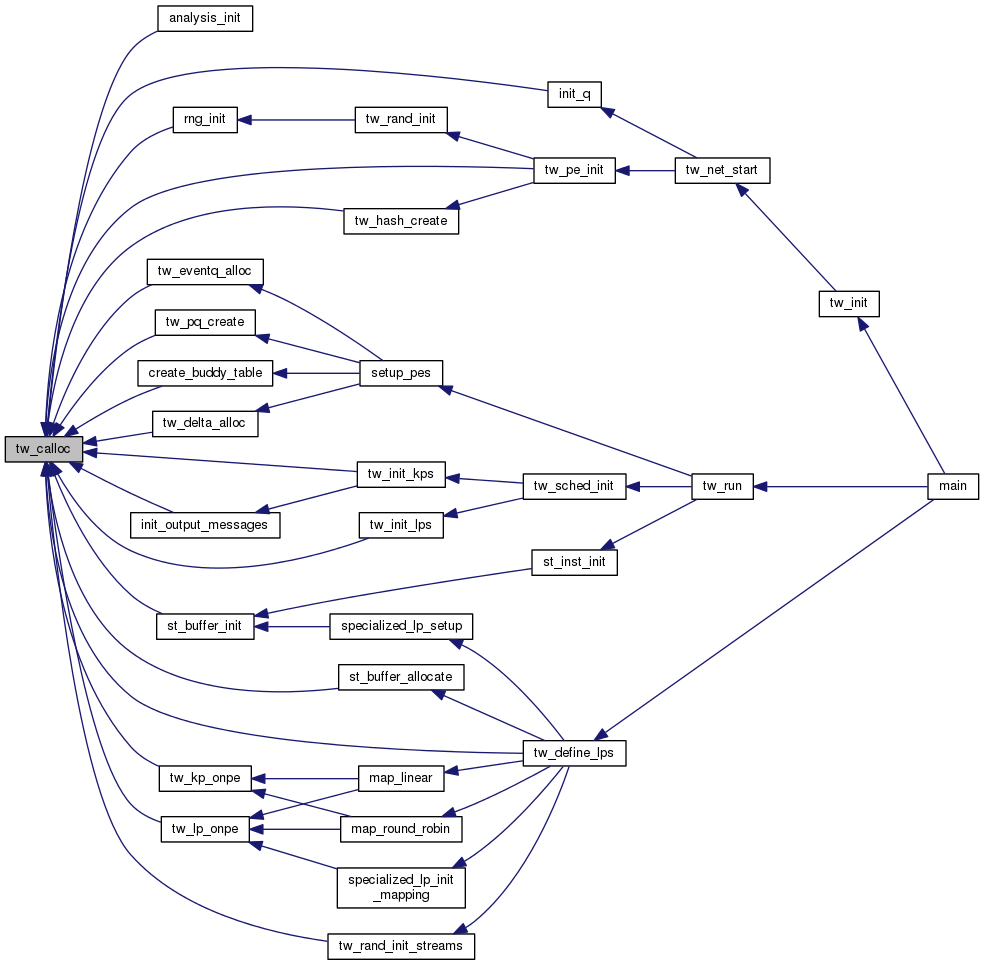
| void tw_calloc_stats | ( | size_t * | alloc, |
| size_t * | waste | ||
| ) |
Definition at line 120 of file tw-util.c.
References mem_pool::end_free, mem_pool::next_free, mem_pool::next_pool, and total_allocated.
Referenced by tw_stats().
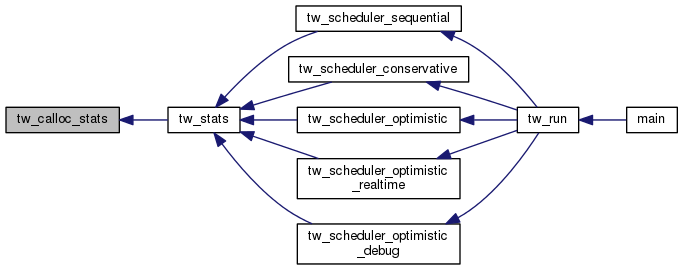
| void tw_clock_init | ( | tw_pe * | me | ) |
Definition at line 28 of file aarch64.c.
References tw_pe::clock_offset, tw_pe::clock_time, and tw_clock_read().
Referenced by tw_sched_init().


Definition at line 35 of file aarch64.c.
References tw_pe::clock_offset, tw_pe::clock_time, and tw_clock_read().

| tw_clock tw_clock_read | ( | ) |
Definition at line 16 of file bgl.c.
Referenced by tw_clock_init(), and tw_clock_now().

| const tw_optdef* tw_clock_setup | ( | ) |
Definition at line 20 of file aarch64.c.
References clock_opts, and g_tw_clock_rate.
Referenced by tw_init().

| void tw_define_lps | ( | tw_lpid | nlp, |
| size_t | msg_sz | ||
| ) |
IMPORTANT: This function sets the value for g_tw_nlp which is a rather important global variable. It is also set in (very few) other places, but mainly just here.
Definition at line 218 of file tw-setup.c.
References CUSTOM, early_sanity_check(), g_st_analysis_nlp, g_tw_custom_initial_mapping, g_tw_kp, g_tw_lp, g_tw_mapping, g_tw_msg_sz, g_tw_nkp, g_tw_nlp, g_tw_nRNG_per_lp, g_tw_rng_default, g_tw_synchronization_protocol, LINEAR, map_linear(), map_round_robin(), nkp_per_pe, OPTIMISTIC_DEBUG, ROUND_ROBIN, specialized_lp_init_mapping(), specialized_lp_setup(), st_buffer_allocate(), tw_calloc(), tw_error(), TW_LOC, and tw_rand_init_streams().
Referenced by main().
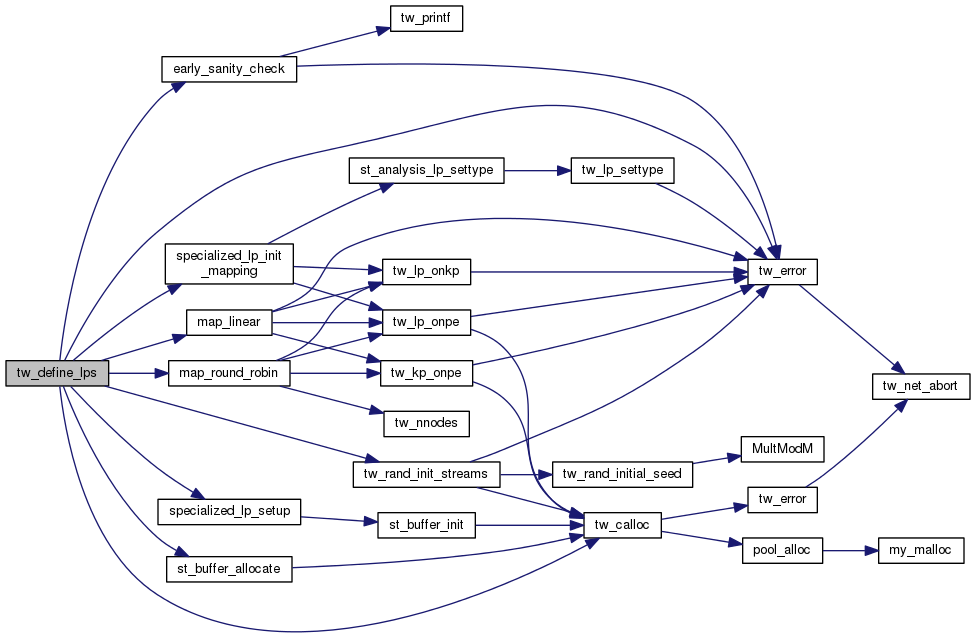

| void tw_end | ( | void | ) |
Definition at line 420 of file tw-setup.c.
References g_tw_csv, tw_ismaster(), and tw_net_stop().
Referenced by main().


| void tw_error | ( | const char * | file, |
| int | line, | ||
| const char * | fmt, | ||
| ... | |||
| ) |
Definition at line 74 of file tw-util.c.
References g_tw_mynode, and tw_net_abort().
Referenced by analysis_init(), apply_opt(), avl_alloc(), avlDelete(), avlInsert(), buddy_alloc(), early_sanity_check(), event_cancel(), io_event_deserialize(), io_load_events(), late_sanity_check(), main(), map_linear(), phold_event_handler(), phold_pre_run(), recv_begin(), recv_finish(), rng_gen_reverse_val(), send_begin(), send_finish(), setup_pes(), st_collect_engine_data_kps(), st_collect_engine_data_lps(), test_q(), tw_calloc(), tw_define_lps(), tw_event_new(), tw_event_send(), tw_eventq_debug(), tw_getkp(), tw_getlocal_lp(), tw_getlp(), tw_gvt_step2(), tw_hash_create(), tw_hash_remove(), tw_init(), tw_init_lps(), tw_kp_onpe(), tw_kp_rollback_event(), tw_lp_onkp(), tw_lp_onpe(), tw_lp_settype(), tw_lp_setup_types(), tw_lp_suspend(), tw_net_barrier(), tw_net_cancel(), tw_net_init(), tw_net_start(), tw_net_statistics(), tw_net_stop(), tw_opt_parse(), tw_pe_init(), tw_pe_settype(), tw_pq_compare_less_than(), tw_pq_delete_any(), tw_pre_run_lps(), tw_rand_init_streams(), tw_rand_normal01(), tw_run(), tw_sched_batch(), tw_sched_batch_realtime(), tw_sched_cancel_q(), tw_sched_event_q(), tw_scheduler_conservative(), tw_scheduler_optimistic_debug(), tw_scheduler_sequential(), tw_snapshot_delta(), tw_snapshot_restore(), and tw_wall_now().

|
inlinestatic |
Referenced by io_load_events(), io_read_checkpoint(), io_store_checkpoint(), st_collect_event_data(), st_create_sample_event(), tw_event_rollback(), tw_eventq_push_list(), tw_sched_batch(), tw_sched_batch_realtime(), tw_scheduler_conservative(), tw_scheduler_optimistic_debug(), and tw_scheduler_sequential().
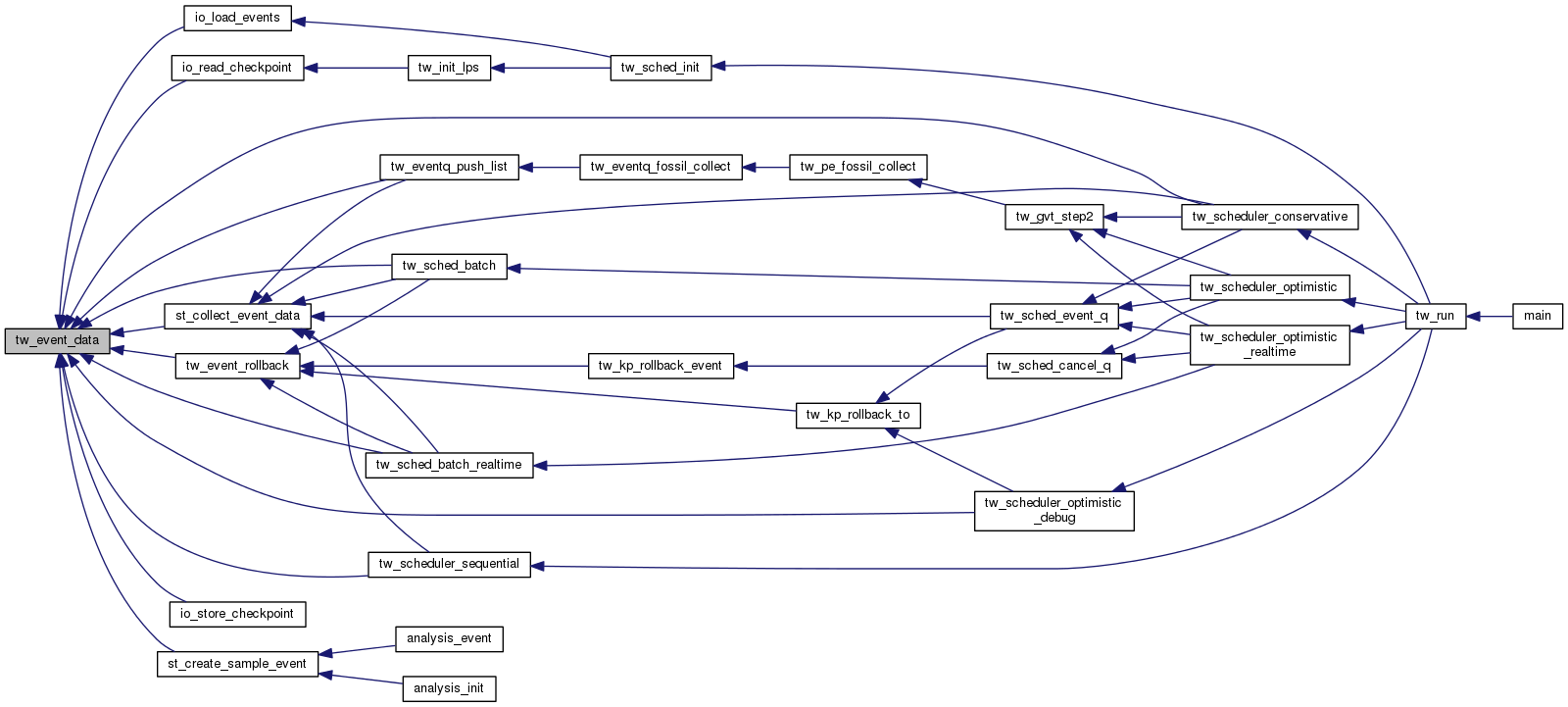
Referenced by event_cancel(), recv_begin(), recv_finish(), send_finish(), tw_eventq_push_list(), tw_net_cancel(), tw_sched_cancel_q(), tw_scheduler_conservative(), and tw_scheduler_sequential().
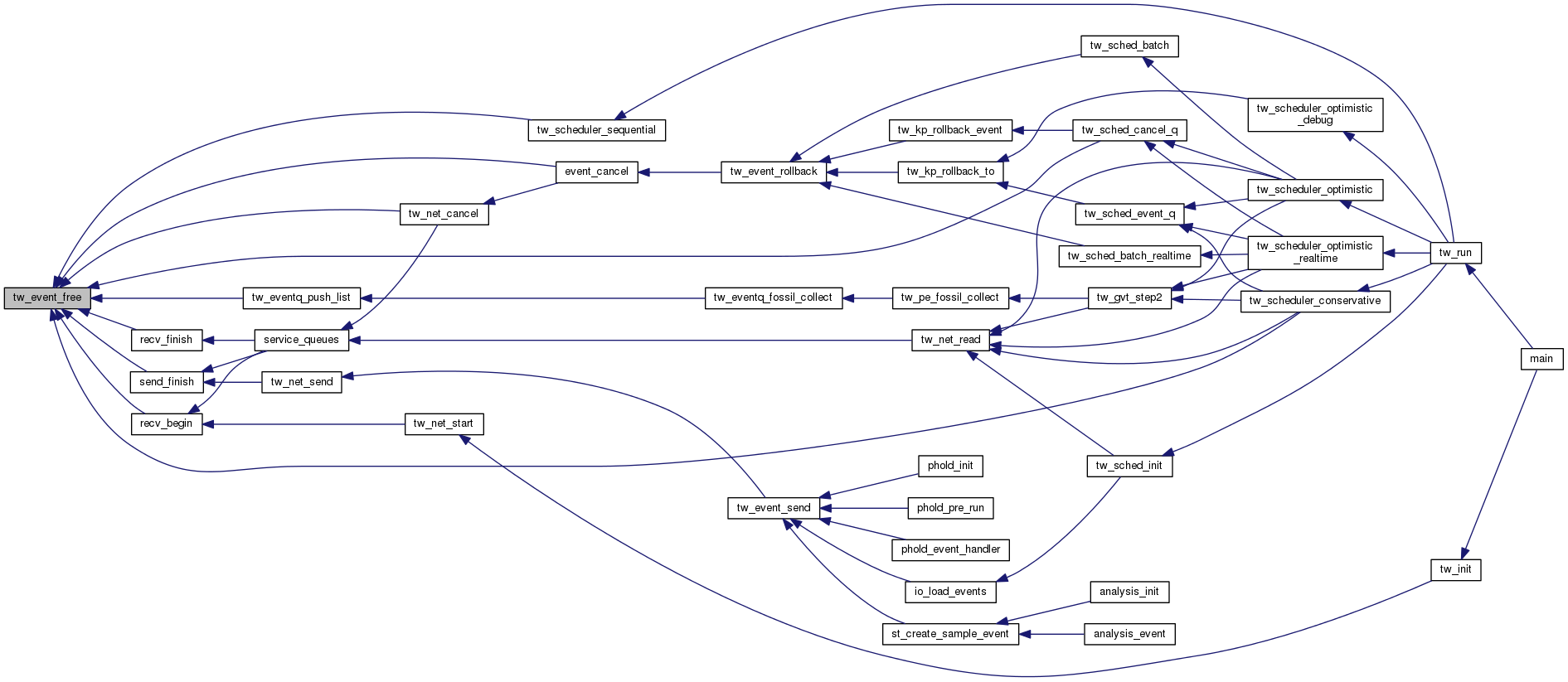
| void tw_event_rollback | ( | tw_event * | event | ) |
Definition at line 181 of file tw-event.c.
References buddy_free(), tw_event::cause_next, tw_event::caused_by_me, tw_lp::critical_path, tw_pe::cur_event, tw_lp::cur_state, tw_event::cv, tw_event::delta_buddy, event_cancel(), g_tw_pe, tw_lp::kp, tw_kp::kp_stats, tw_kp::last_time, tw_lp::lp_stats, tw_lp::pe, tw_event::recv_ts, tw_lptype::revent, tw_statistics::s_buddy, st_kp_stats::s_e_rbs, st_lp_stats::s_e_rbs, tw_kp::s_e_rbs, tw_pe::stats, tw_lp::suspend_do_orig_event_rc, tw_lp::suspend_error_number, tw_lp::suspend_event, tw_lp::suspend_flag, tw_lp::suspend_time, tw_clock_read(), tw_event_data(), tw_free_output_messages(), TW_STIME_CMP, TW_STIME_CRT, and tw_lp::type.
Referenced by tw_kp_rollback_event(), tw_kp_rollback_to(), tw_sched_batch(), and tw_sched_batch_realtime().
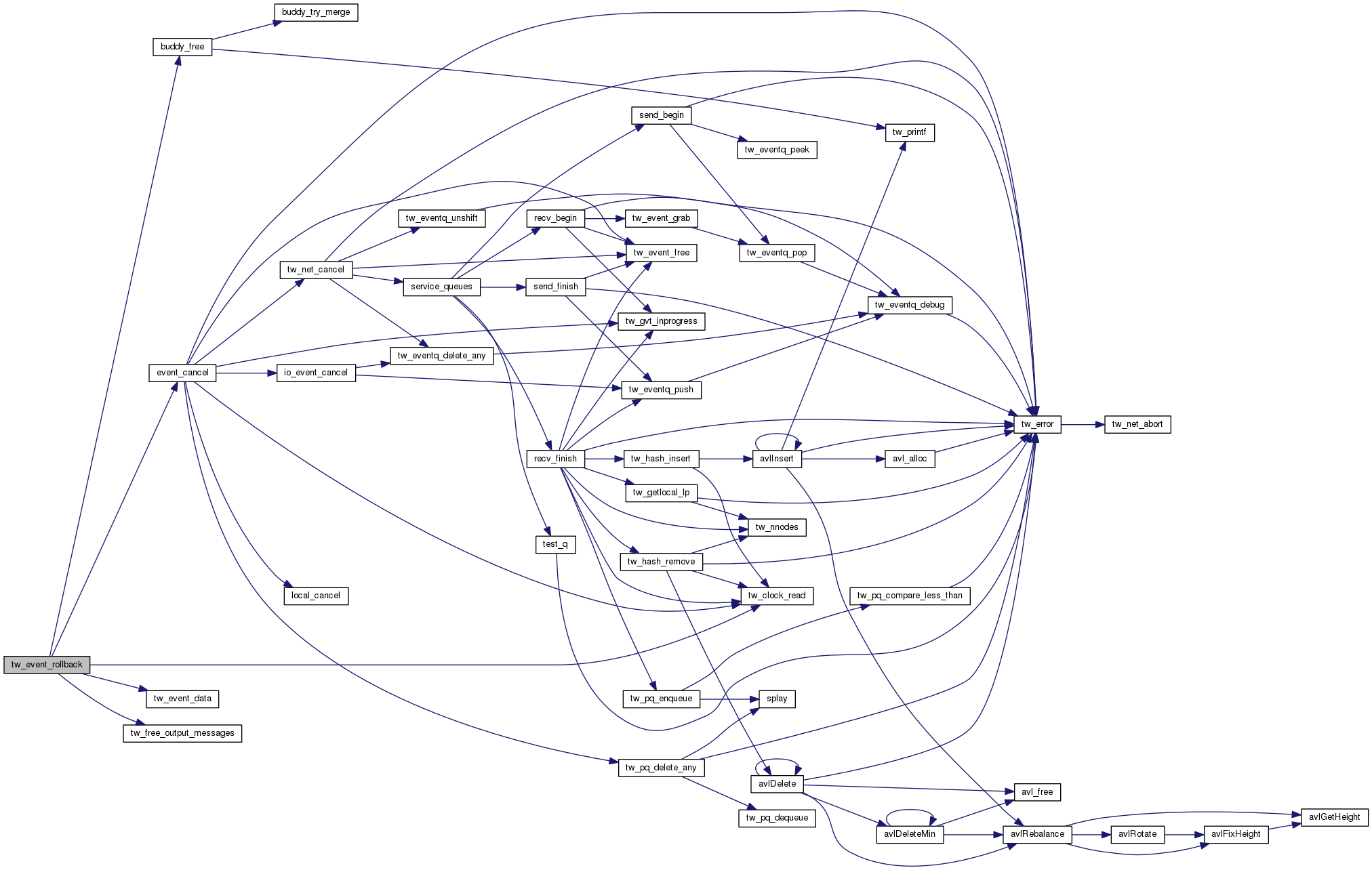

| void tw_event_send | ( | tw_event * | event | ) |
Definition at line 9 of file tw-event.c.
References tw_pe::abort_event, tw_pe::cev_abort, CONSERVATIVE, tw_pe::cur_event, tw_event::dest_lp, tw_event::dest_lpid, tw_pe::event_q, g_tw_lookahead, g_tw_mynode, g_tw_synchronization_protocol, g_tw_ts_end, tw_lp::gid, tw_pe::id, tw_lp::kp, tw_kp::last_time, link_causality(), tw_lptype::map, tw_event::out_msgs, tw_lp::pe, tw_pe::pq, tw_statistics::s_net_other, tw_statistics::s_nsend_loc_remote, tw_statistics::s_nsend_net_remote, tw_statistics::s_pq, tw_pe::seq_num, tw_pe::stats, tw_pe::trans_msg_ts, tw_clock_read(), tw_error(), tw_eventq_push(), tw_getlocal_lp(), tw_gvt_inprogress(), TW_LOC, TW_net_asend, tw_net_send(), tw_now(), TW_pe_event_q, tw_pq_enqueue(), TW_STIME_CMP, TW_STIME_DBL, and tw_lp::type.
Referenced by io_load_events(), phold_event_handler(), phold_init(), phold_pre_run(), and st_create_sample_event().
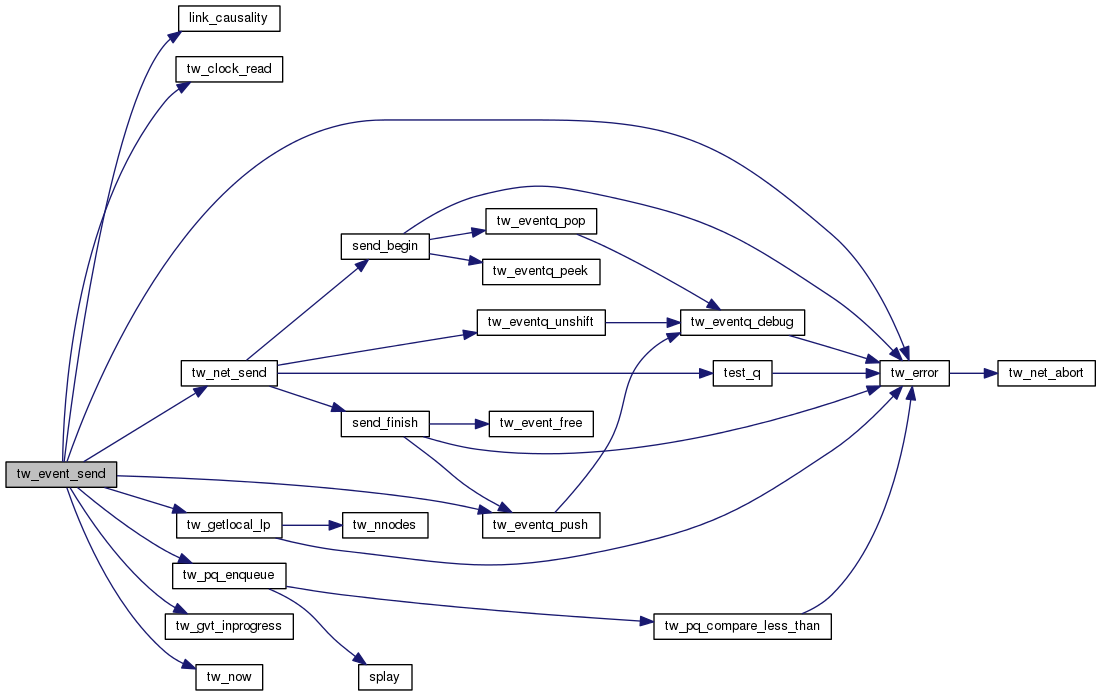
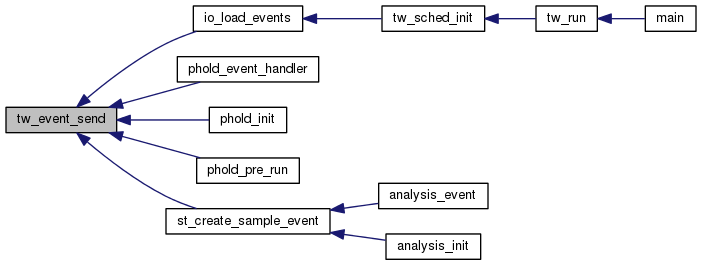
|
inlinestatic |
Referenced by tw_event_rollback(), and tw_eventq_push_list().

| void tw_get_stats | ( | tw_pe * | me, |
| tw_statistics * | s | ||
| ) |
Definition at line 35 of file tw-stats.c.
References tw_pe::end_time, g_tw_fossil_attempts, g_tw_min_detected_offset, g_tw_nkp, g_tw_pe, g_tw_sim_started, tw_pe::pq, ROSS_MAX, tw_statistics::s_alp_e_rbs, tw_statistics::s_alp_nevent_processed, tw_statistics::s_avl, tw_statistics::s_buddy, tw_statistics::s_cancel_q, tw_statistics::s_e_rbs, tw_kp::s_e_rbs, tw_statistics::s_event_abort, tw_statistics::s_event_process, tw_statistics::s_events_past_end, tw_statistics::s_fc_attempts, tw_statistics::s_fossil_collect, tw_statistics::s_gvt, tw_statistics::s_init, tw_statistics::s_lz4, tw_statistics::s_max_run_time, tw_statistics::s_min_detected_offset, tw_statistics::s_net_events, tw_statistics::s_net_other, tw_statistics::s_net_read, tw_statistics::s_nevent_abort, tw_statistics::s_nevent_processed, tw_kp::s_nevent_processed, tw_statistics::s_nread_network, tw_statistics::s_nsend_loc_remote, tw_statistics::s_nsend_net_remote, tw_statistics::s_nsend_network, tw_statistics::s_nsend_remote_rb, tw_statistics::s_pe_event_ties, tw_statistics::s_pq, tw_statistics::s_pq_qsize, tw_statistics::s_rb_primary, tw_statistics::s_rb_secondary, tw_kp::s_rb_secondary, tw_statistics::s_rb_total, tw_kp::s_rb_total, tw_statistics::s_rollback, tw_statistics::s_stat_comp, tw_statistics::s_stat_write, tw_statistics::s_total, tw_pe::start_time, tw_pe::stats, tw_getkp(), tw_pq_get_size(), tw_wall_sub(), and tw_wall_to_double().
Referenced by st_collect_engine_data(), and tw_stats().
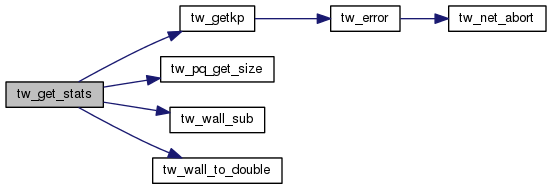
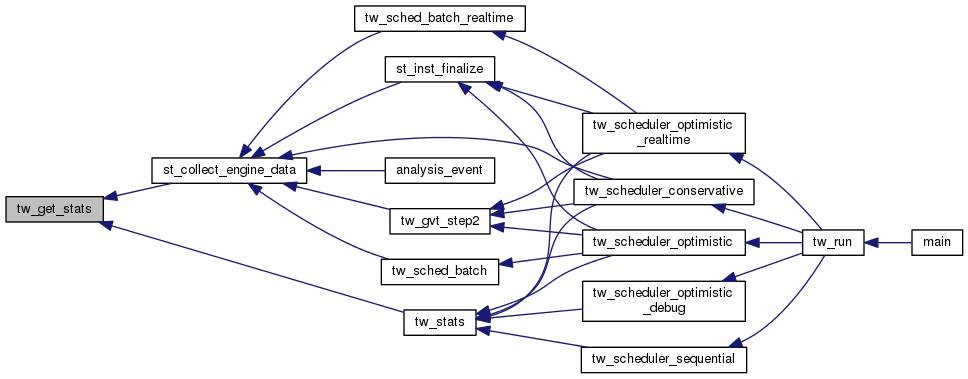
| void tw_init | ( | int * | argc, |
| char *** | argv | ||
| ) |
Definition at line 33 of file tw-setup.c.
References g_st_use_analysis_lps, g_tw_csv, init_start, io_opts, ROSS_VERSION, st_inst_opts(), st_special_lp_opts(), tw_clock_read(), tw_clock_setup(), tw_error(), tw_gvt_setup(), tw_gvt_start(), tw_ismaster(), TW_LOC, tw_net_init(), tw_net_start(), tw_opt_add(), and tw_opt_parse().
Referenced by main().
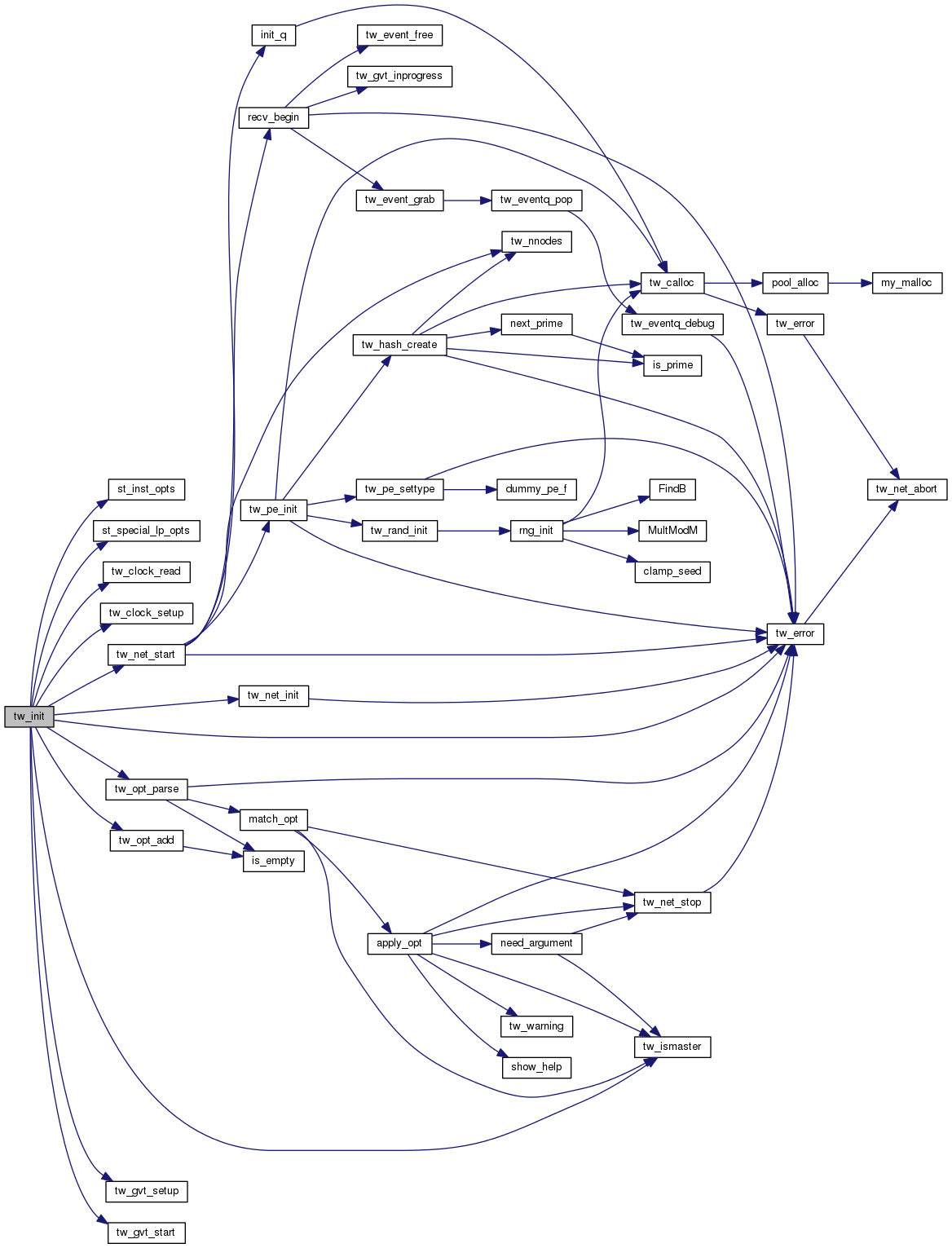

| void tw_init_kps | ( | tw_pe * | me | ) |
Definition at line 131 of file tw-kp.c.
References g_tw_nkp, g_tw_synchronization_protocol, tw_kp::id, init_output_messages(), tw_kp::kp_stats, tw_kp::last_stats, OPTIMISTIC, OPTIMISTIC_DEBUG, OPTIMISTIC_REALTIME, tw_kp::output, tw_kp::pe, tw_kp::s_e_rbs, tw_kp::s_nevent_processed, tw_kp::s_rb_secondary, tw_kp::s_rb_total, tw_calloc(), tw_getkp(), and TW_LOC.
Referenced by tw_sched_init().


| void tw_init_lps | ( | tw_pe * | me | ) |
Definition at line 83 of file tw-lp.c.
References tw_pe::abort_event, tw_event::caused_by_me, tw_pe::cev_abort, tw_pe::cur_event, tw_lp::cur_state, g_io_load_at, g_st_analysis_nlp, g_tw_lp, g_tw_nlp, INIT, tw_lptype::init, io_read_checkpoint(), tw_lp::last_stats, tw_lp::lp_stats, tw_lp::pe, POST_INIT, PRE_INIT, tw_lptype::state_sz, tw_pe::stats, tw_calloc(), tw_clock_read(), tw_error(), TW_LOC, and tw_lp::type.
Referenced by tw_sched_init().
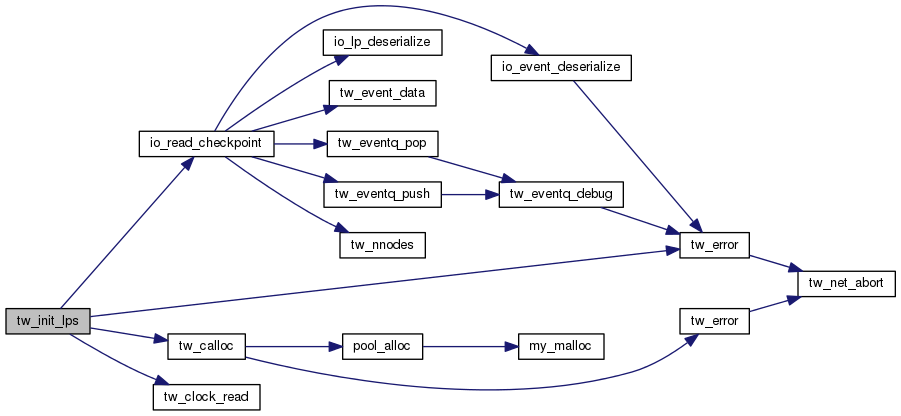

Definition at line 162 of file tw-kp.c.
References tw_out::next, and tw_kp::output.
Referenced by tw_output().

Definition at line 4 of file tw-kp.c.
References g_tw_kp, g_tw_nkp, tw_kp::id, pe, tw_kp::pe, tw_calloc(), tw_error(), and TW_LOC.
Referenced by map_linear(), and map_round_robin().


| void tw_kp_put_back_output_buffer | ( | tw_out * | out | ) |
Definition at line 175 of file tw-kp.c.
References tw_out::next, tw_kp::output, and tw_out::owner.
Referenced by tw_free_output_messages().

| void tw_kp_rollback_event | ( | tw_event * | event | ) |
Definition at line 67 of file tw-kp.c.
References tw_pe::GVT, tw_eventq::head, tw_kp::id, tw_pe::id, tw_kp::kp_stats, tw_kp::last_time, pe, tw_kp::pe, tw_kp::pevent_q, tw_pe::pq, tw_event::recv_ts, tw_statistics::s_pq, st_kp_stats::s_rb_secondary, tw_kp::s_rb_secondary, st_kp_stats::s_rb_total, tw_kp::s_rb_total, tw_eventq::size, tw_pe::stats, tw_clock_read(), tw_error(), tw_event_rollback(), tw_eventq_shift(), TW_LOC, and tw_pq_enqueue().
Referenced by tw_sched_cancel_q().
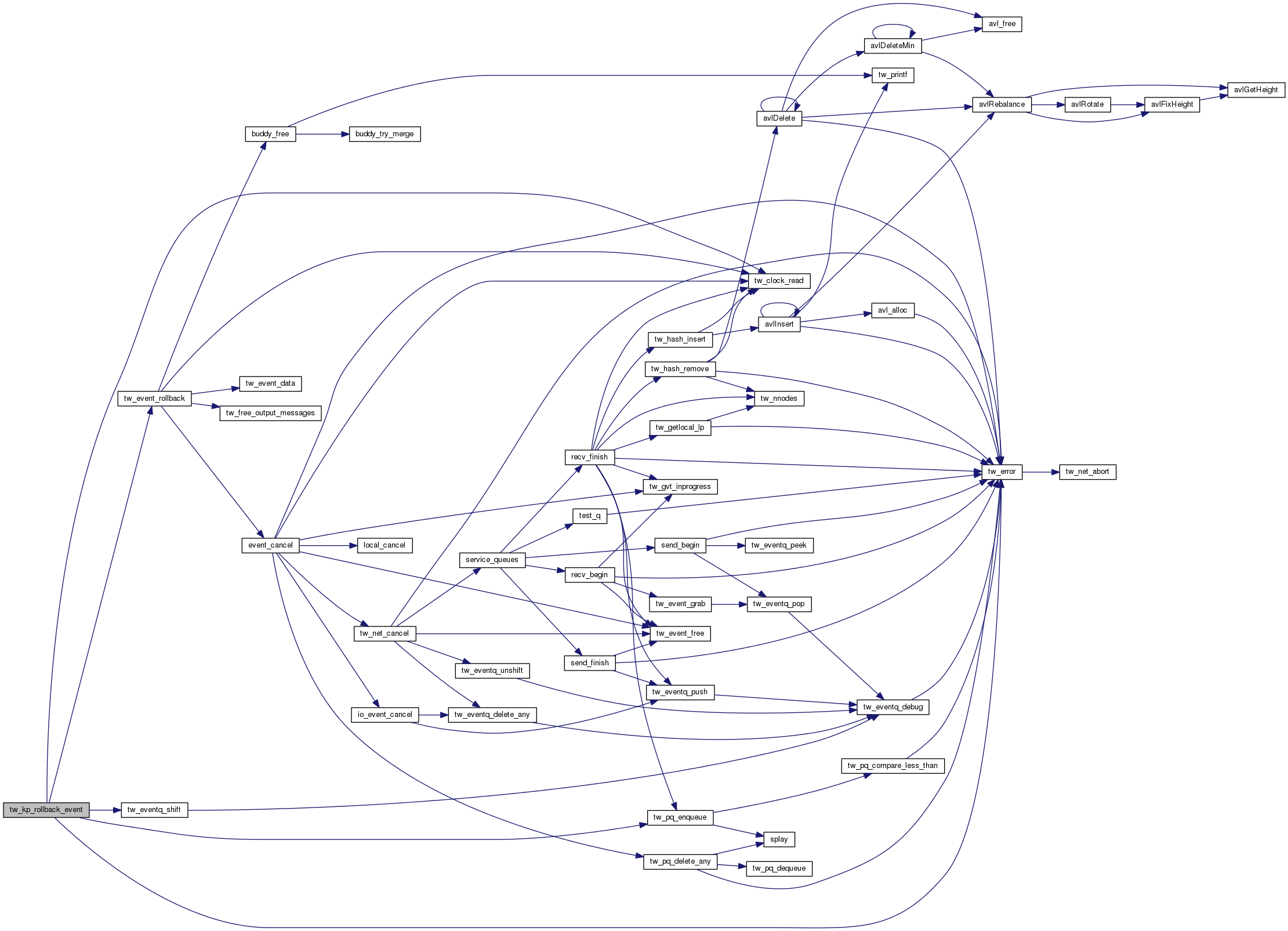

Definition at line 23 of file tw-kp.c.
References tw_pe::GVT, tw_eventq::head, tw_kp::id, tw_pe::id, tw_kp::kp_stats, tw_kp::last_time, tw_kp::pe, tw_kp::pevent_q, tw_pe::pq, tw_event::recv_ts, tw_statistics::s_pq, st_kp_stats::s_rb_total, tw_kp::s_rb_total, tw_eventq::size, tw_pe::stats, tw_clock_read(), tw_event_rollback(), tw_eventq_shift(), tw_pq_enqueue(), TW_STIME_CMP, and TW_STIME_DBL.
Referenced by tw_sched_event_q(), and tw_scheduler_optimistic_debug().
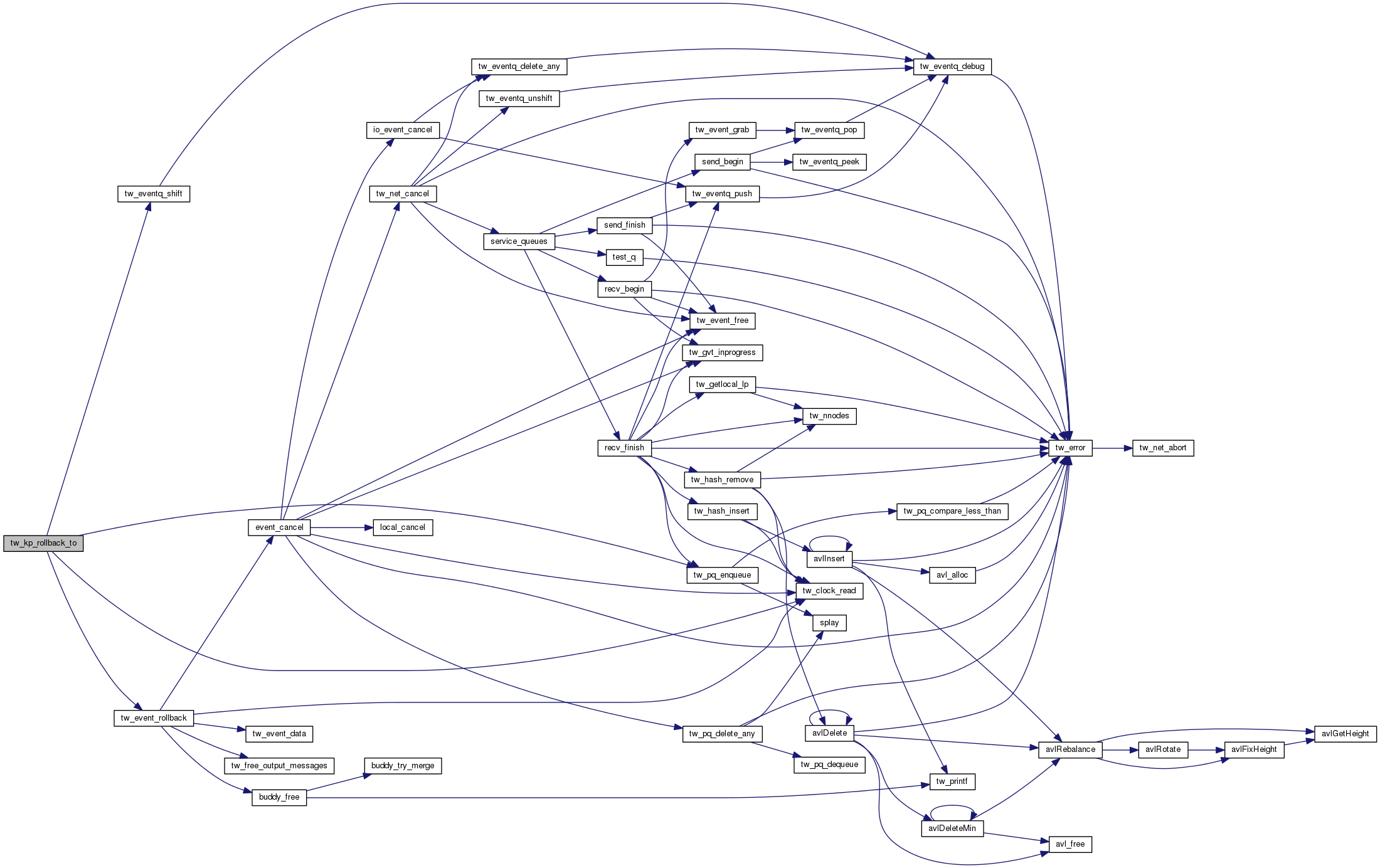

Definition at line 73 of file tw-lp.c.
References tw_lp::kp, tw_kp::lp_count, tw_error(), and TW_LOC.
Referenced by map_linear(), map_round_robin(), and specialized_lp_init_mapping().


Definition at line 57 of file tw-lp.c.
References g_st_analysis_nlp, g_tw_lp, g_tw_nlp, tw_lp::gid, tw_lp::id, pe, tw_lp::pe, tw_calloc(), tw_error(), and TW_LOC.
Referenced by map_linear(), map_round_robin(), and specialized_lp_init_mapping().


IMPORTANT: This function should be called after tw_define_lps. It copies the function pointers which define the LP to the appropriate location for each LP, i.e. you probably want to call this more than once.
Definition at line 38 of file tw-lp.c.
References g_st_analysis_nlp, g_tw_delta_sz, g_tw_lp, g_tw_nlp, tw_lp::gid, tw_lp::pe, tw_lptype::state_sz, tw_error(), TW_LOC, and tw_lp::type.
Referenced by main(), and st_analysis_lp_settype().


| void tw_lp_setup_types | ( | ) |
Definition at line 11 of file tw-lp.c.
References g_st_ev_trace, g_tw_lp, g_tw_lp_typemap, g_tw_lp_types, g_tw_nlp, tw_lp::gid, st_model_setup_types(), tw_error(), TW_LOC, and tw_lp::type.

| void tw_lp_suspend | ( | tw_lp * | lp, |
| int | do_orig_event_rc, | ||
| int | error_num | ||
| ) |
LP Suspension Design Notes! (John Jenkins, ANL)
Many times, when developing optimistic models, we are able to determine < LP state, event > pairs which represent infeasible model behavior. These types of simulation states typically arise when time warp causes us to receive and potentially process messages in an order we don't expect.
For example, consider a client/server protocol in which a server sends an ACK to a client upon completion of some event. In optimistic mode, the client can see what amounts to duplicate ACKs from the server due to the server LP rolling back and re-sending an ACK.
While some models can gracefully cope with such issues, more complex models can have troubles (the client in the example could for instance destroy the request metadata after receiving an ACK).
A solution, as noted in the "Dark Side of Risk" paper, is to introduce LP "self-suspend" functionality. If an LP is able to detect a < state, message > pair which is incorrect / unexpected in a well-behaved simulation, the LP should be able to put itself into suspend mode, refusing to process messages until rolled back to a pre < state, message > state. There are two benefits: 1) it greatly reduces the difficulty in tracking down and distinguishing proper model bugs from bugs arising from time-warp related issues such as out-of-order event receipt and 2) it improves simulation performance by pruning the number of processed events that we know are invalid and will be rolled back anyways.
I suggest the function signature tw_suspend(tw_lp *lp, int do_suspend_event_rc, const char * format, ...), with the following semantics:
After a call to tw_suspend, all subsequent events (both forward and reverse) that arrive at the suspended LP shall be processed as if they were no-ops. The reverse event handler of the event that caused the suspend will be run if do_orig_event_rc is nonzero; otherwise, the reverse event handler shall additionally be a no-op. Typically, do_orig_event_rc == 0 is desired, as good coding practices for moderate-or-greater complexity simulations dictate state/event validation prior to modifying LP state (partial rollbacks are very undesirable), but there may be messy logic in the user code for which a partial rollback is warranted (operations that free memory as a side effect of operations, for example). An LP exits suspend state upon rolling back the event that caused the suspend (whether or not that event is processed as a no-op). Upon GVT, if an LP is in self-suspend mode and the event that caused the suspend has a timestamp less than that of GVT, then the simulator shall report the format string of suspended LP(s) and exit. A NULL format string is acceptable for performance purposes, e.g. when doing "production" simulation runs.
- Parameters
-
lp Pointer to the LP we're suspending do_orig_event_rc A bool indicating whether or not to skip the RC function error_num User-specified value for tracking purposes; ROSS ignores this
Definition at line 227 of file tw-lp.c.
References tw_pe::cur_event, tw_lp::pe, tw_lp::suspend_do_orig_event_rc, tw_lp::suspend_error_number, tw_lp::suspend_event, tw_lp::suspend_flag, tw_lp::suspend_time, tw_error(), TW_LOC, and tw_now().

| int tw_output | ( | tw_lp * | lp, |
| const char * | fmt, | ||
| ... | |||
| ) |
Rollback-aware printf, i.e. if the event gets rolled back, undo the printf. We can'd do that of course so we store the message in a buffer until GVT.
Definition at line 8 of file tw-util.c.
References CONSERVATIVE, tw_pe::cur_event, g_tw_synchronization_protocol, tw_kp::id, tw_lp::kp, tw_out::message, tw_out::next, tw_event::out_msgs, tw_lp::pe, SEQUENTIAL, tw_kp_grab_output_buffer(), TW_LOC, and tw_printf().

| void tw_pe_fossil_collect | ( | void | ) |
Definition at line 62 of file tw-pe.c.
References g_tw_fossil_attempts, g_tw_nkp, g_tw_pe, tw_kp::pevent_q, tw_eventq_fossil_collect(), and tw_getkp().
Referenced by tw_gvt_step2().


| void tw_pe_init | ( | void | ) |
initialize individual PE structs
must be called after tw_nnodes / MPI world size is set.
Definition at line 32 of file tw-pe.c.
References g_tw_mynode, g_tw_pe, g_tw_synchronization_protocol, tw_pe::gvt_status, tw_pe::hash_t, tw_pe::id, OPTIMISTIC, OPTIMISTIC_DEBUG, OPTIMISTIC_REALTIME, tw_pe::rng, tw_pe::trans_msg_ts, tw_calloc(), tw_error(), tw_hash_create(), TW_LOC, tw_pe_settype(), and tw_rand_init().
Referenced by tw_net_start().
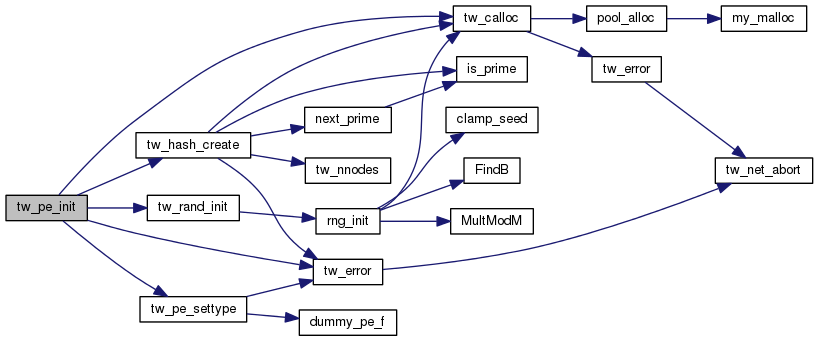

| void tw_pe_settype | ( | const tw_petype * | type | ) |
Definition at line 9 of file tw-pe.c.
References copy_pef, dummy_pe_f(), g_tw_pe, tw_error(), and TW_LOC.
Referenced by tw_pe_init().


| void tw_pre_run_lps | ( | tw_pe * | me | ) |
Definition at line 147 of file tw-lp.c.
References tw_pe::abort_event, tw_event::caused_by_me, tw_pe::cev_abort, tw_pe::cur_event, tw_lp::cur_state, g_st_analysis_nlp, g_tw_lp, g_tw_nlp, tw_lp::pe, tw_lptype::pre_run, tw_error(), TW_LOC, and tw_lp::type.
Referenced by tw_sched_init().


| void tw_printf | ( | const char * | file, |
| int | line, | ||
| const char * | fmt, | ||
| ... | |||
| ) |
Definition at line 61 of file tw-util.c.
Referenced by avlInsert(), buddy_free(), early_sanity_check(), and tw_output().

| void tw_rand_init_streams | ( | tw_lp * | lp, |
| unsigned int | nstreams | ||
| ) |
Definition at line 320 of file rand-clcg4.c.
References g_tw_nRNG_per_lp, tw_lp::gid, tw_lp::rng, tw_calloc(), tw_error(), TW_LOC, and tw_rand_initial_seed().
Referenced by tw_define_lps().


| void tw_run | ( | void | ) |
Definition at line 339 of file tw-setup.c.
References CONSERVATIVE, g_tw_synchronization_protocol, tw_pe::id, init_start, late_sanity_check(), OPTIMISTIC, OPTIMISTIC_DEBUG, OPTIMISTIC_REALTIME, tw_statistics::s_init, SEQUENTIAL, setup_pes(), st_inst_init(), tw_pe::stats, tw_clock_read(), tw_error(), TW_LOC, tw_sched_init(), tw_scheduler_conservative(), tw_scheduler_optimistic(), tw_scheduler_optimistic_debug(), tw_scheduler_optimistic_realtime(), and tw_scheduler_sequential().
Referenced by main().
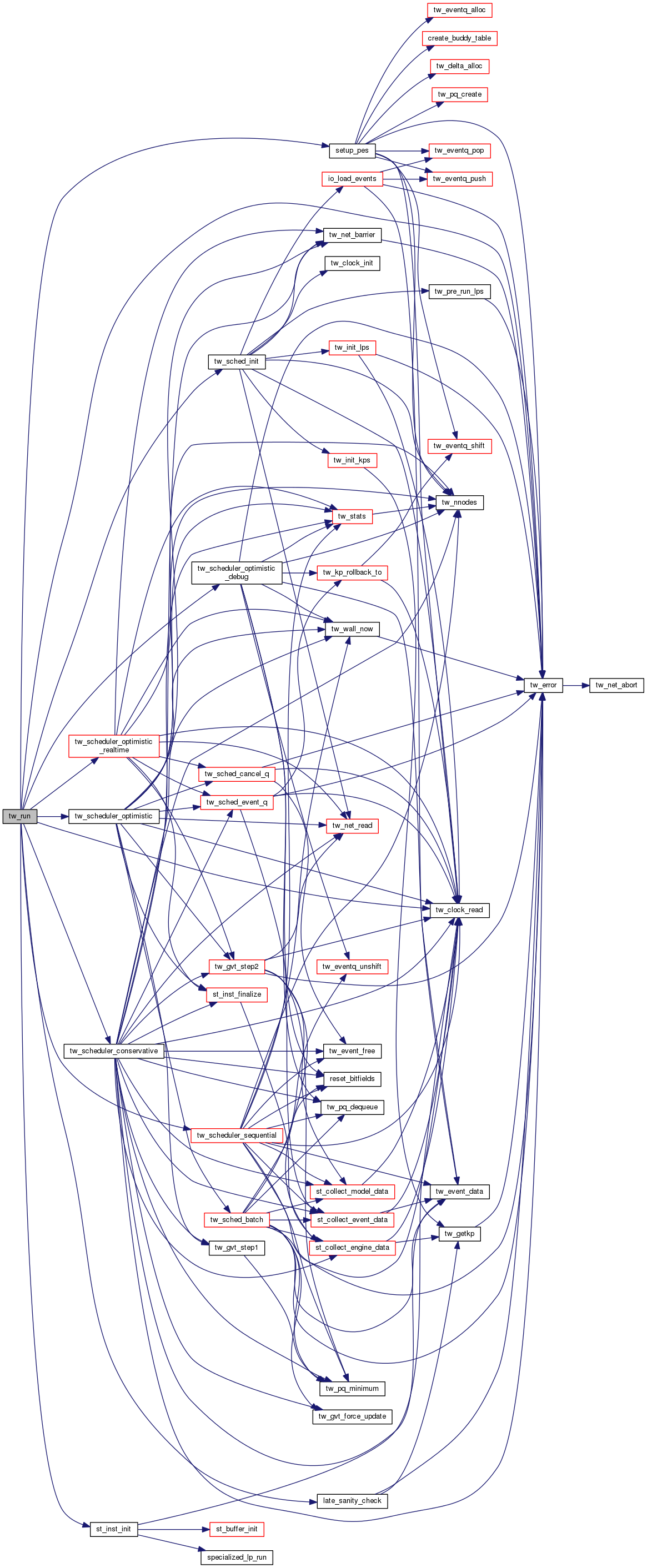

| void tw_sched_init | ( | tw_pe * | me | ) |
Definition at line 404 of file tw-sched.c.
References g_tw_sim_started, io_load_events(), tw_petype::post_lp_init, tw_petype::pre_lp_init, tw_pe::stats, tw_clock_init(), tw_clock_read(), tw_init_kps(), tw_init_lps(), tw_net_barrier(), tw_net_read(), tw_nnodes(), tw_pre_run_lps(), and tw_pe::type.
Referenced by tw_run().
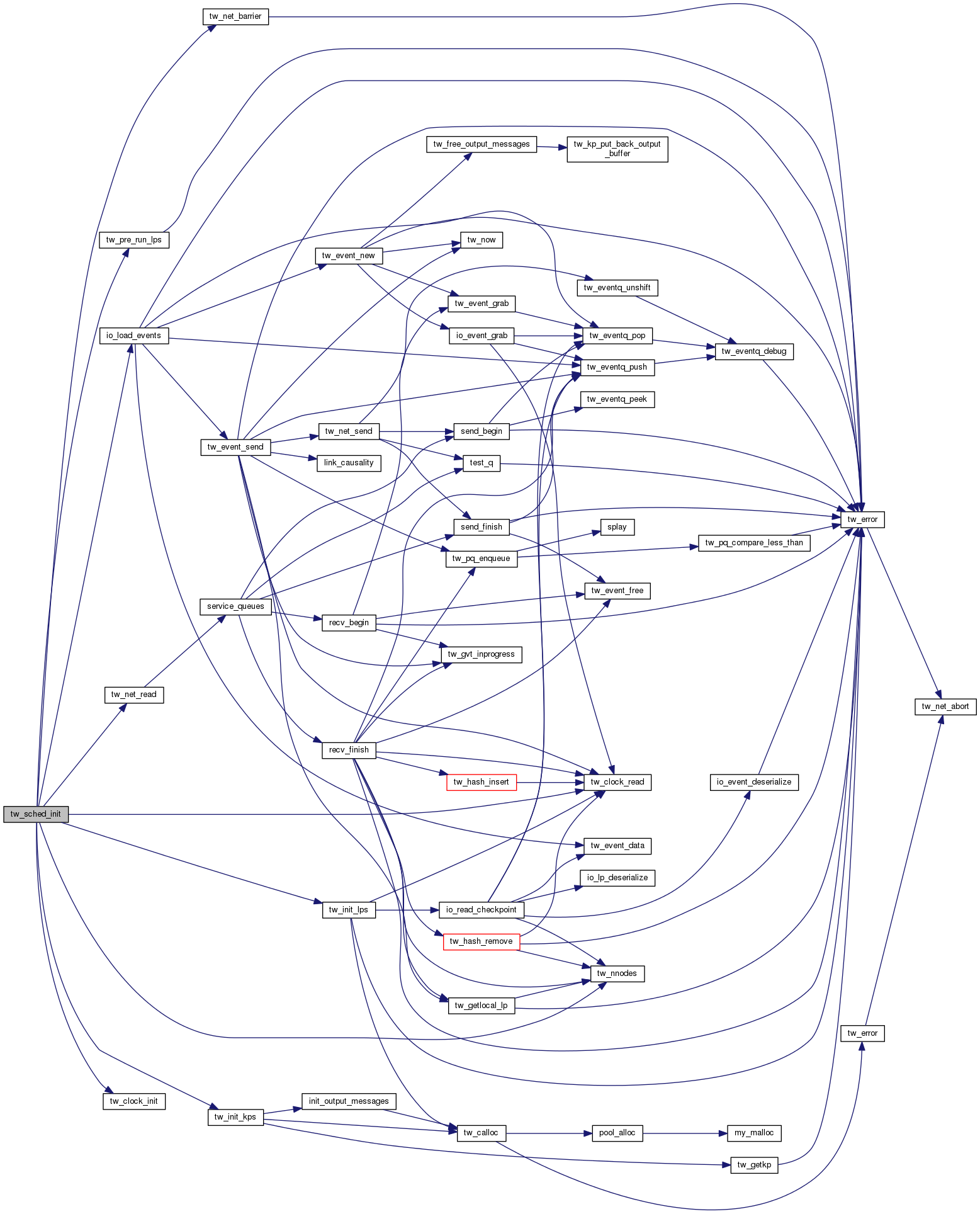

| void tw_scheduler_conservative | ( | tw_pe * | me | ) |
Definition at line 514 of file tw-sched.c.
References ALL_STATS, tw_pe::cev_abort, tw_lptype::commit, tw_event::critical_path, tw_lp::critical_path, tw_pe::cur_event, tw_lp::cur_state, tw_event::cv, tw_event::dest_lp, tw_pe::end_time, tw_lptype::event, tw_petype::final, tw_pe::free_q, FULL_TRACE, g_st_engine_stats, g_st_ev_trace, g_st_model_stats, g_st_rt_interval, g_st_rt_samp_start_cycles, g_st_rt_sampling, g_tw_clock_rate, g_tw_gvt_threshold, g_tw_lookahead, g_tw_masternode, g_tw_mblock, g_tw_mynode, g_tw_ts_end, tw_lp::gid, tw_pe::GVT, tw_pe::id, tw_lp::kp, tw_kp::kp_stats, tw_kp::last_time, tw_lp::lp_stats, tw_lp::pe, tw_pe::pq, tw_event::recv_ts, reset_bitfields(), ROSS_MAX, RT_COL, RT_STATS, tw_statistics::s_event_process, tw_statistics::s_net_read, st_kp_stats::s_nevent_processed, st_lp_stats::s_nevent_processed, tw_kp::s_nevent_processed, tw_statistics::s_pe_event_ties, tw_statistics::s_pq, tw_statistics::s_total, tw_event::send_lp, tw_event::send_pe, tw_eventq::size, st_collect_engine_data(), st_collect_event_data(), st_collect_model_data(), st_inst_finalize(), tw_pe::start_time, tw_pe::stats, tw_clock_read(), tw_error(), tw_event_data(), tw_event_free(), tw_gvt_force_update(), tw_gvt_step1(), tw_gvt_step2(), TW_LOC, tw_net_barrier(), tw_net_read(), tw_nnodes(), tw_pq_dequeue(), tw_pq_minimum(), tw_sched_event_q(), tw_stats(), TW_STIME_CMP, TW_STIME_DBL, tw_wall_now(), tw_lp::type, and tw_pe::type.
Referenced by tw_run().
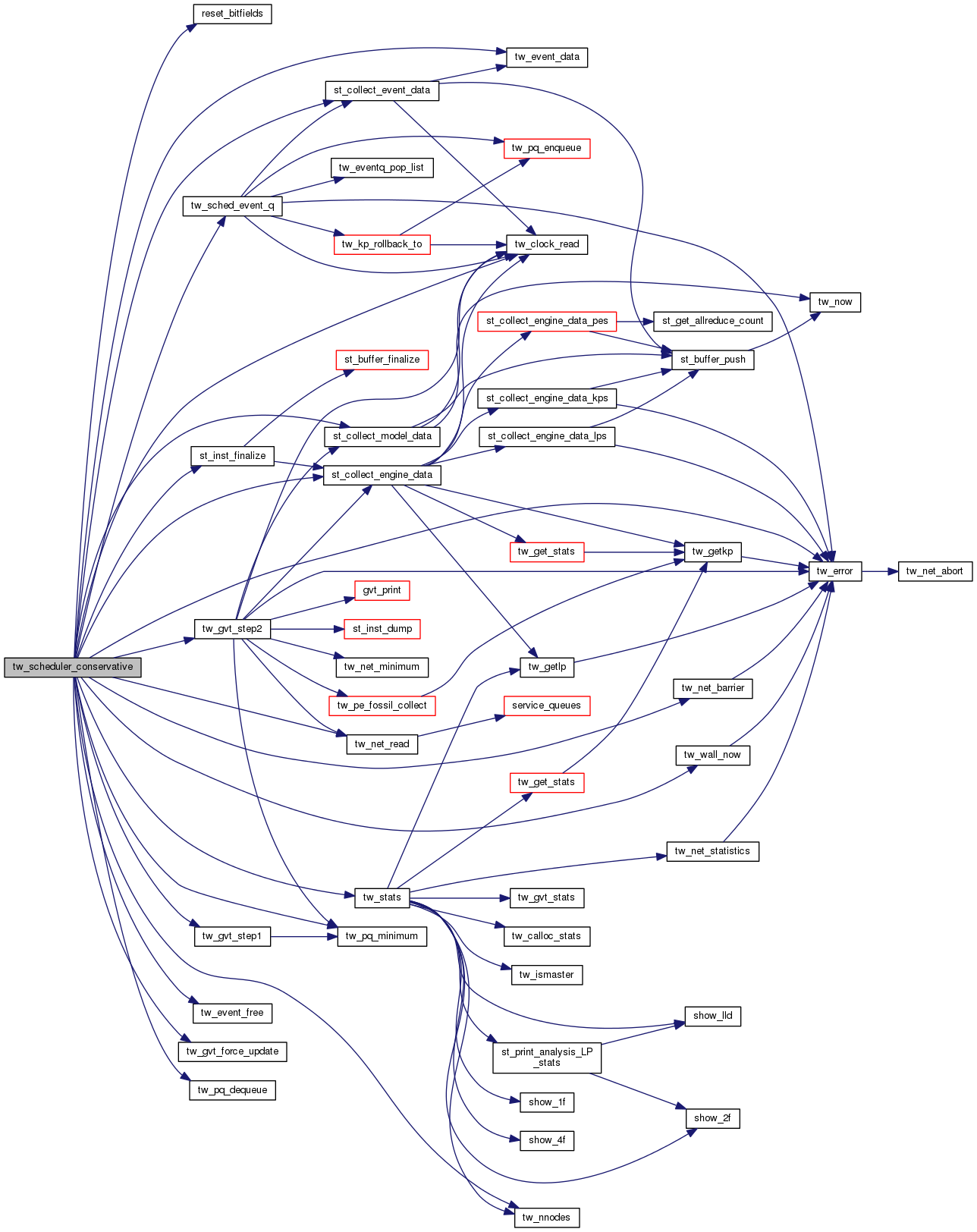

| void tw_scheduler_optimistic | ( | tw_pe * | me | ) |
Definition at line 634 of file tw-sched.c.
References tw_pe::end_time, tw_petype::final, g_tw_masternode, g_tw_mynode, g_tw_ts_end, tw_pe::GVT, tw_statistics::s_net_read, tw_statistics::s_total, st_inst_finalize(), tw_pe::start_time, tw_pe::stats, tw_clock_read(), tw_gvt_step1(), tw_gvt_step2(), tw_net_barrier(), tw_net_read(), tw_nnodes(), tw_sched_batch(), tw_sched_cancel_q(), tw_sched_event_q(), tw_stats(), TW_STIME_DBL, tw_wall_now(), and tw_pe::type.
Referenced by tw_run().
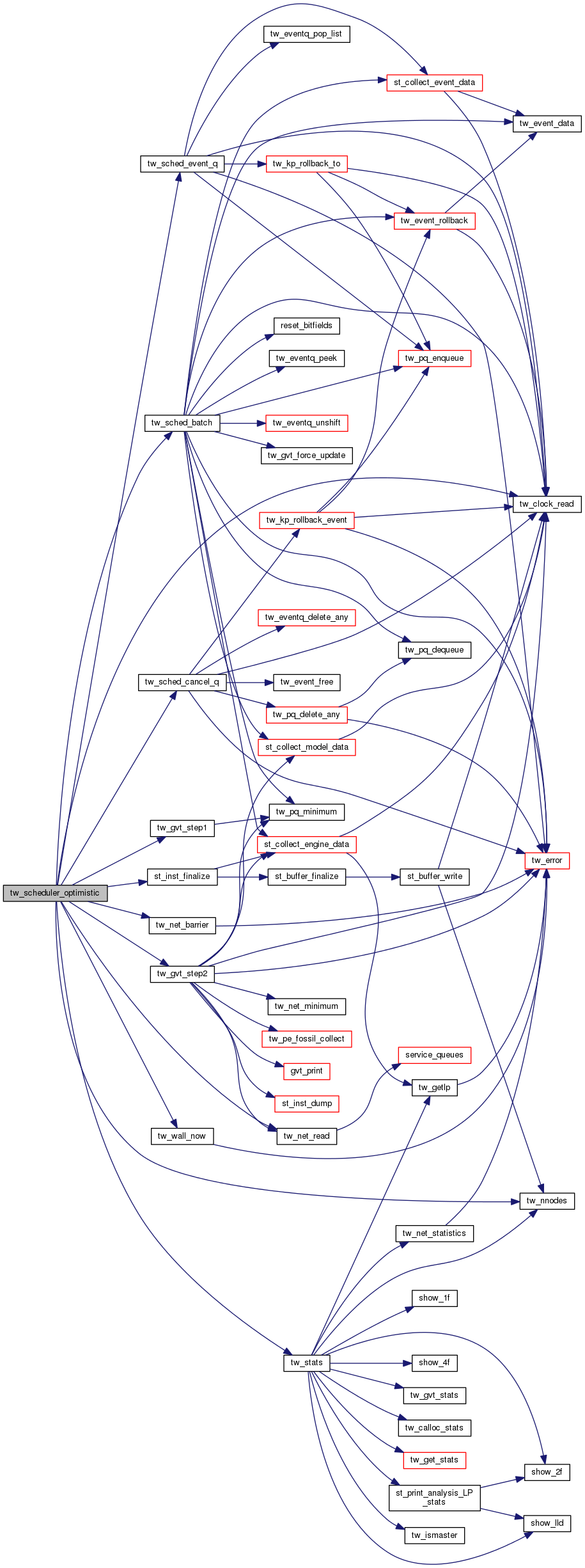

| void tw_scheduler_optimistic_debug | ( | tw_pe * | me | ) |
Definition at line 733 of file tw-sched.c.
References tw_event::critical_path, tw_lp::critical_path, tw_pe::cur_event, tw_lp::cur_state, tw_event::cv, tw_event::dest_lp, tw_pe::end_time, tw_lptype::event, tw_petype::final, tw_pe::free_q, g_tw_kp, g_tw_nkp, g_tw_rollback_time, tw_lp::kp, tw_kp::last_time, tw_event::owner, tw_kp::pevent_q, tw_pe::pq, tw_event::recv_ts, reset_bitfields(), ROSS_MAX, tw_kp::s_nevent_processed, tw_eventq::size, tw_pe::start_time, tw_event::state, tw_error(), tw_event_data(), tw_eventq_unshift(), TW_kp_pevent_q, tw_kp_rollback_to(), TW_LOC, tw_nnodes(), tw_pq_dequeue(), tw_stats(), TW_STIME_CRT, tw_wall_now(), tw_lp::type, and tw_pe::type.
Referenced by tw_run().
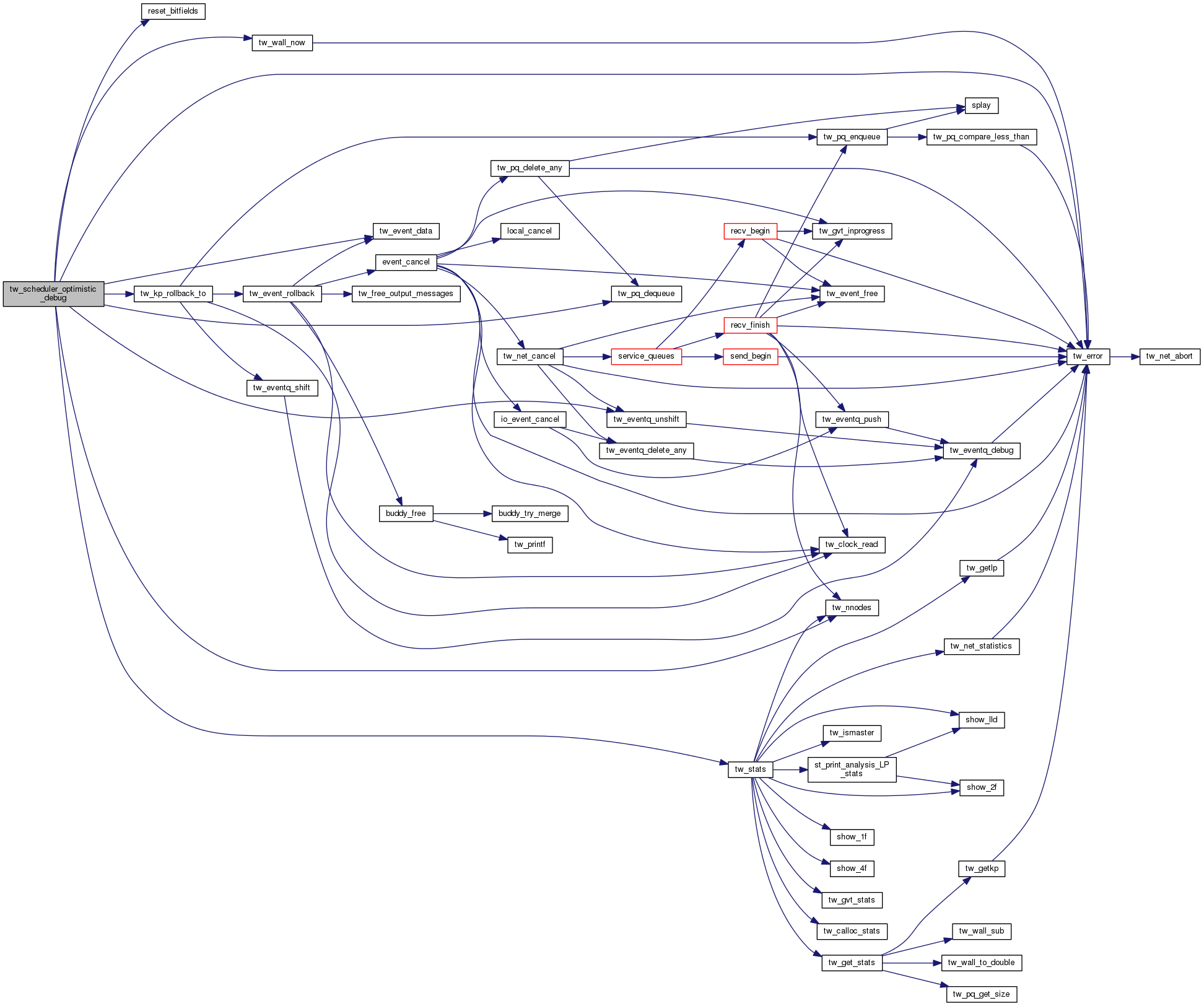

| void tw_scheduler_optimistic_realtime | ( | tw_pe * | me | ) |
Definition at line 680 of file tw-sched.c.
References tw_pe::end_time, tw_petype::final, g_tw_clock_rate, g_tw_gvt_interval, g_tw_gvt_interval_start_cycles, g_tw_gvt_realtime_interval, g_tw_masternode, g_tw_mynode, g_tw_ts_end, tw_pe::GVT, tw_statistics::s_net_read, tw_statistics::s_total, st_inst_finalize(), tw_pe::start_time, tw_pe::stats, tw_clock_read(), tw_gvt_step1_realtime(), tw_gvt_step2(), tw_net_barrier(), tw_net_read(), tw_nnodes(), tw_sched_batch_realtime(), tw_sched_cancel_q(), tw_sched_event_q(), tw_stats(), TW_STIME_DBL, tw_wall_now(), and tw_pe::type.
Referenced by tw_run().
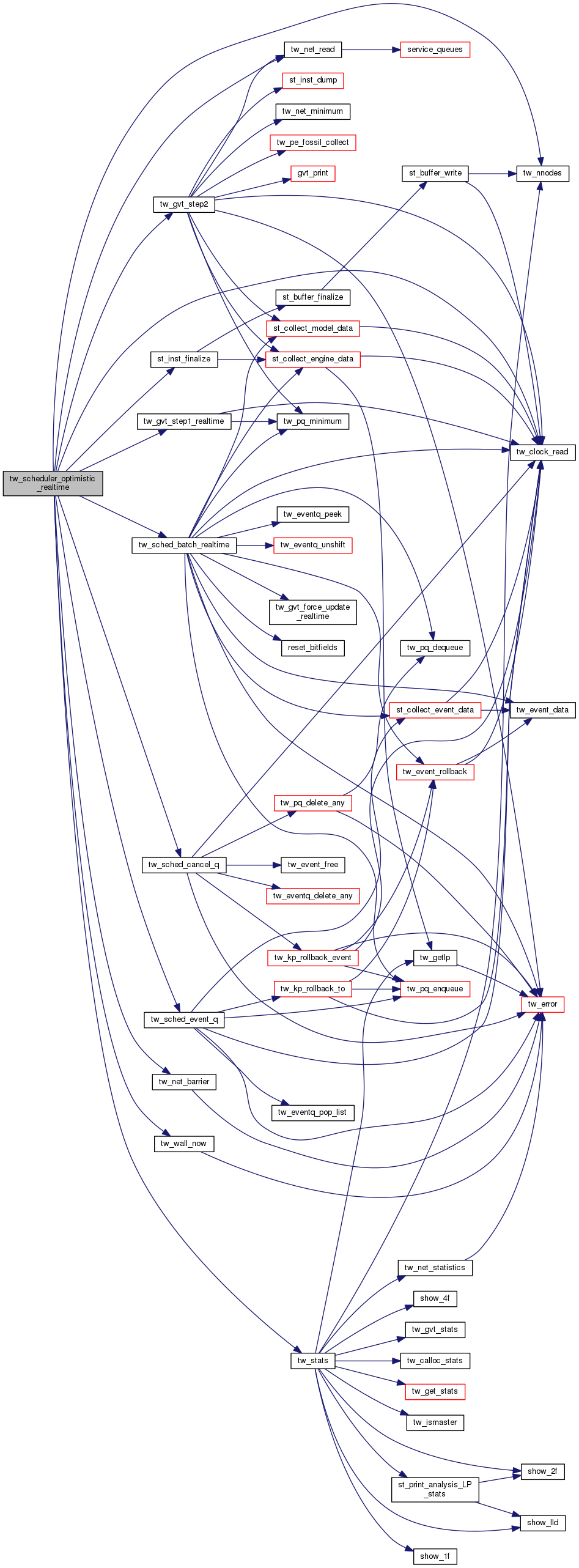

| void tw_scheduler_sequential | ( | tw_pe * | me | ) |
Definition at line 445 of file tw-sched.c.
References ALL_STATS, tw_pe::cev_abort, tw_lptype::commit, tw_event::critical_path, tw_lp::critical_path, tw_pe::cur_event, tw_lp::cur_state, tw_event::cv, tw_event::dest_lp, tw_pe::end_time, tw_lptype::event, tw_petype::final, FULL_TRACE, g_st_ev_trace, g_st_model_stats, g_st_rt_interval, g_st_rt_samp_start_cycles, g_st_rt_sampling, g_tw_clock_rate, g_tw_masternode, g_tw_mynode, g_tw_ts_end, gvt_print(), tw_lp::kp, tw_kp::kp_stats, tw_kp::last_time, tw_lp::lp_stats, percent_complete, tw_pe::pq, tw_event::recv_ts, reset_bitfields(), ROSS_MAX, RT_STATS, st_kp_stats::s_nevent_processed, st_lp_stats::s_nevent_processed, tw_kp::s_nevent_processed, tw_statistics::s_pe_event_ties, tw_statistics::s_total, st_collect_event_data(), st_collect_model_data(), tw_pe::start_time, tw_pe::stats, tw_clock_read(), tw_error(), tw_event_data(), tw_event_free(), TW_LOC, tw_nnodes(), tw_pq_dequeue(), tw_pq_minimum(), tw_stats(), TW_STIME_CMP, TW_STIME_CRT, TW_STIME_DBL, tw_wall_now(), tw_lp::type, and tw_pe::type.
Referenced by tw_run().
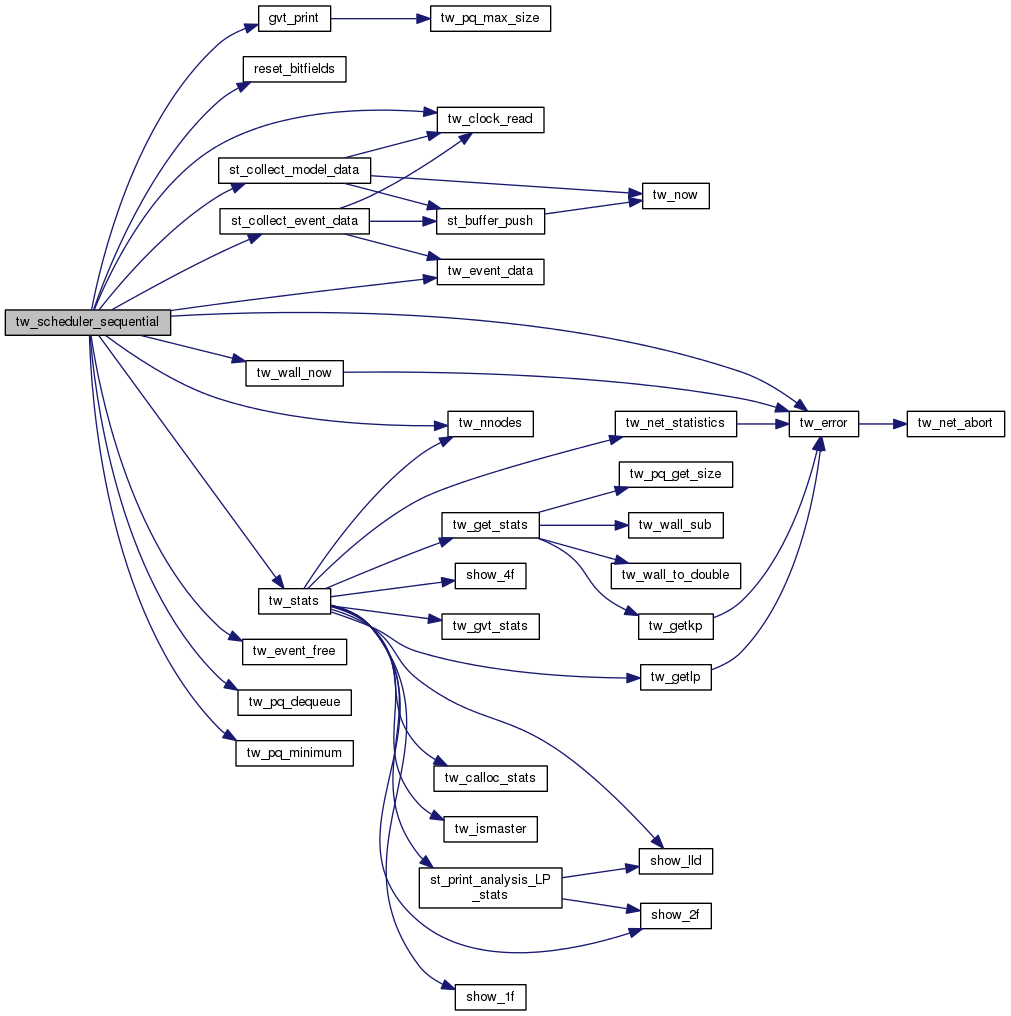

| void tw_snapshot | ( | tw_lp * | lp, |
| size_t | state_sz | ||
| ) |
Make a snapshot of the LP state and store it into the delta buffer
Definition at line 9 of file tw-state.c.
References tw_lp::cur_state, tw_pe::delta_buffer, and tw_lp::pe.
| long tw_snapshot_delta | ( | tw_lp * | lp, |
| size_t | state_sz | ||
| ) |
Create the delta from the current state and the snapshot. Compress it.
- Returns
- The size of the compressed data placed in delta_buffer[1].
Definition at line 21 of file tw-state.c.
References buddy_alloc(), tw_pe::cur_event, tw_lp::cur_state, tw_event::delta_buddy, tw_pe::delta_buffer, tw_event::delta_size, g_tw_delta_sz, g_tw_lz4_knob, g_tw_pe, LZ4_compress_fast_extState(), tw_lp::pe, tw_statistics::s_buddy, tw_statistics::s_lz4, tw_pe::stats, tw_clock_read(), tw_error(), and TW_LOC.
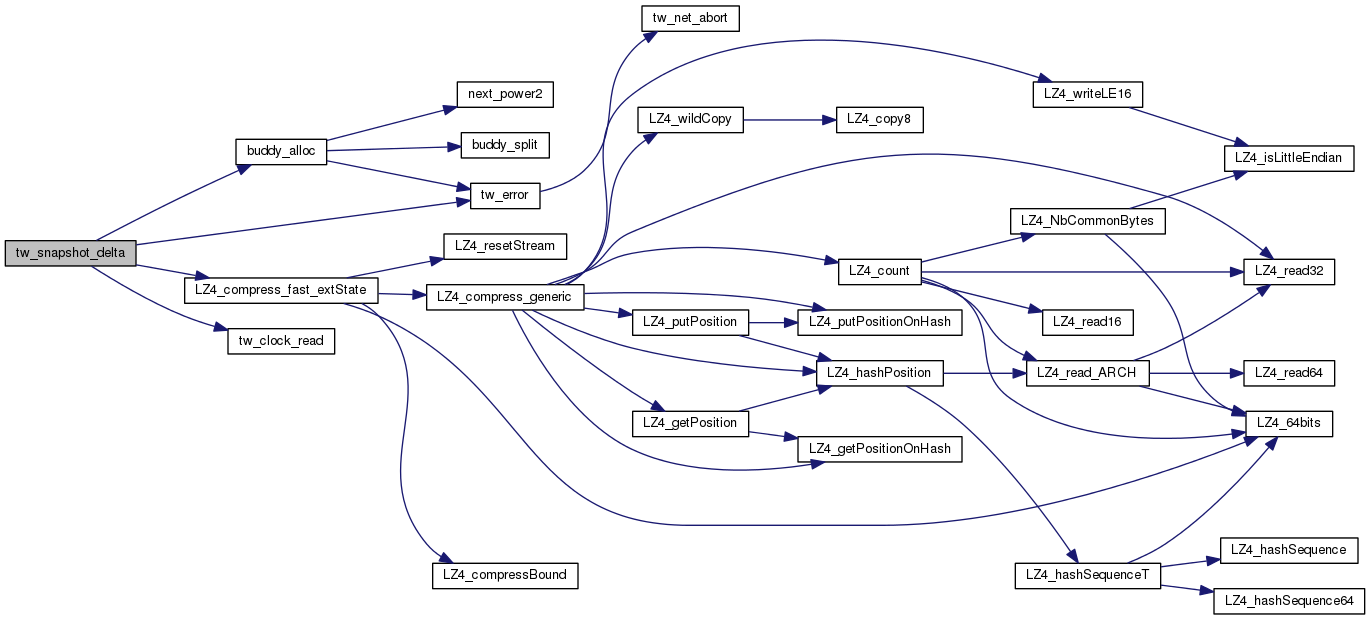
| void tw_snapshot_restore | ( | tw_lp * | lp, |
| size_t | state_sz | ||
| ) |
Restore the state of lp to the (decompressed) data held in buffer
Definition at line 55 of file tw-state.c.
References tw_pe::cur_event, tw_lp::cur_state, tw_event::delta_buddy, tw_pe::delta_buffer, g_tw_pe, LZ4_decompress_fast(), tw_lp::pe, tw_statistics::s_lz4, tw_pe::stats, tw_clock_read(), tw_error(), and TW_LOC.

| void tw_stats | ( | tw_pe * | me | ) |
Definition at line 125 of file tw-stats.c.
References CONSERVATIVE, tw_lp::cur_state, tw_lptype::final, g_st_analysis_nlp, g_st_use_analysis_lps, g_tw_clock_rate, g_tw_csv, g_tw_events_per_pe, g_tw_events_per_pe_extra, g_tw_gvt_done, g_tw_msg_sz, g_tw_nlp, g_tw_synchronization_protocol, tw_lp::rng, tw_statistics::s_avl, tw_statistics::s_buddy, tw_statistics::s_cancel_q, tw_statistics::s_e_rbs, tw_statistics::s_event_abort, tw_statistics::s_event_process, tw_statistics::s_events_past_end, tw_statistics::s_fc_attempts, tw_statistics::s_fossil_collect, tw_statistics::s_gvt, tw_statistics::s_init, tw_statistics::s_lz4, tw_statistics::s_max_run_time, tw_statistics::s_min_detected_offset, tw_statistics::s_net_events, tw_statistics::s_net_other, tw_statistics::s_net_read, tw_statistics::s_nevent_abort, tw_statistics::s_nevent_processed, tw_statistics::s_nread_network, tw_statistics::s_nsend_loc_remote, tw_statistics::s_nsend_net_remote, tw_statistics::s_nsend_network, tw_statistics::s_pe_event_ties, tw_statistics::s_pq, tw_statistics::s_rb_primary, tw_statistics::s_rb_secondary, tw_statistics::s_rb_total, tw_statistics::s_rollback, tw_statistics::s_stat_comp, tw_statistics::s_stat_write, tw_statistics::s_total, show_1f(), show_2f(), show_4f(), show_lld(), st_print_analysis_LP_stats(), tw_lptype::state_sz, tw_calloc_stats(), tw_get_stats(), tw_getlp(), tw_gvt_stats(), tw_ismaster(), tw_net_statistics(), tw_nnodes(), and tw_lp::type.
Referenced by tw_scheduler_conservative(), tw_scheduler_optimistic(), tw_scheduler_optimistic_debug(), tw_scheduler_optimistic_realtime(), and tw_scheduler_sequential().
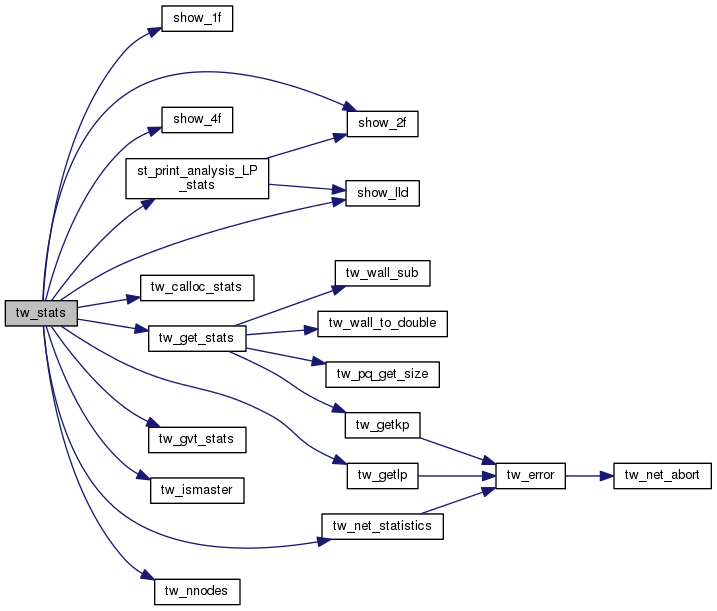
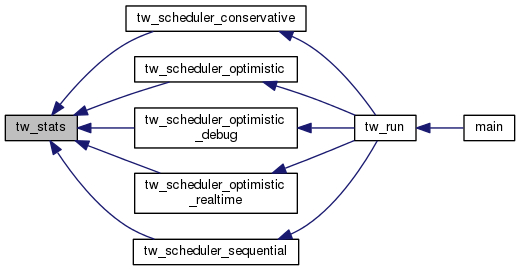
| void tw_wall_now | ( | tw_wtime * | t | ) |
Definition at line 4 of file tw-timing.c.
References tw_error(), and TW_LOC.
Referenced by tw_scheduler_conservative(), tw_scheduler_optimistic(), tw_scheduler_optimistic_debug(), tw_scheduler_optimistic_realtime(), and tw_scheduler_sequential().

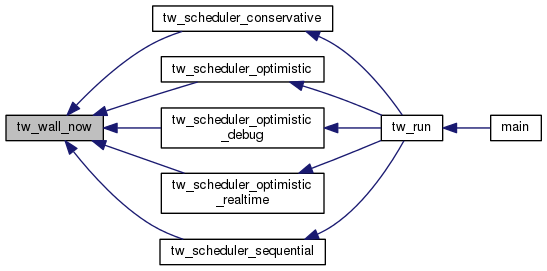
Definition at line 11 of file tw-timing.c.
Referenced by tw_get_stats().
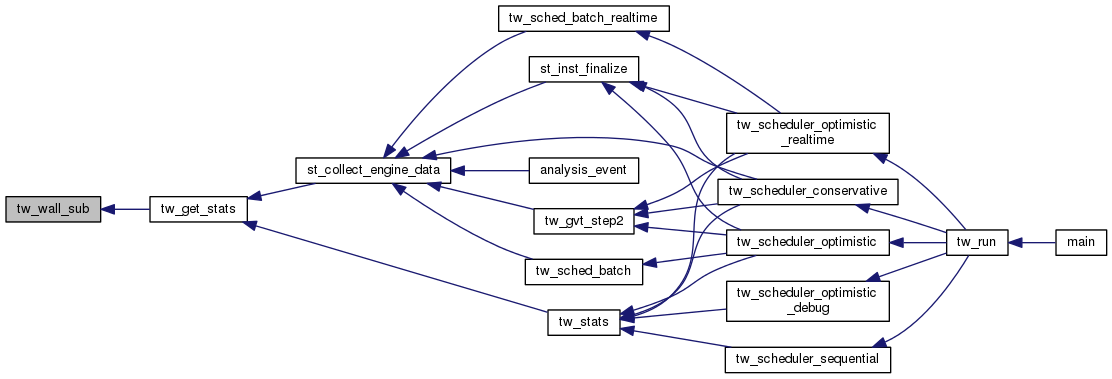
| double tw_wall_to_double | ( | tw_wtime * | t | ) |
Definition at line 24 of file tw-timing.c.
Referenced by tw_get_stats().

| void tw_warning | ( | const char * | file, |
| int | line, | ||
| const char * | fmt, | ||
| ... | |||
| ) |
Definition at line 90 of file tw-util.c.
References g_tw_mynode.
Referenced by apply_opt().

Variable Documentation
| uint32_t g_tw_avl_node_count |
Definition at line 37 of file ross-global.c.
Referenced by avl_alloc(), avlInsert(), and tw_hash_create().
| uint32_t g_tw_buddy_alloc |
| buddy_list_bucket_t* g_tw_buddy_master |
Definition at line 36 of file ross-global.c.
Referenced by buddy_alloc(), buddy_free(), buddy_try_merge(), and setup_pes().
| unsigned long long g_tw_clock_rate |
Definition at line 98 of file ross-global.c.
| FILE* g_tw_csv |
Definition at line 91 of file ross-global.c.
Referenced by setup_pes(), show_1f(), show_2f(), show_4f(), show_lld(), tw_end(), tw_init(), tw_opt_print(), and tw_stats().
| map_custom_f g_tw_custom_initial_mapping |
Definition at line 20 of file ross-global.c.
Referenced by tw_define_lps().
| map_local_f g_tw_custom_lp_global_to_local_map |
Definition at line 19 of file ross-global.c.
Referenced by io_event_deserialize(), and tw_getlocal_lp().
| tw_clock g_tw_cycles_cancel |
| tw_clock g_tw_cycles_ev_abort |
| tw_clock g_tw_cycles_ev_proc |
| tw_clock g_tw_cycles_ev_queue |
| tw_clock g_tw_cycles_gvt |
| tw_clock g_tw_cycles_rbs |
| size_t g_tw_delta_sz |
Definition at line 34 of file ross-global.c.
Referenced by tw_delta_alloc(), tw_lp_settype(), and tw_snapshot_delta().
| size_t g_tw_event_msg_sz |
Definition at line 43 of file ross-global.c.
Referenced by tw_eventq_alloc().
| unsigned int g_tw_events_per_pe |
Definition at line 76 of file ross-global.c.
Referenced by main(), setup_pes(), tw_eventq_alloc(), and tw_stats().
| unsigned int g_tw_events_per_pe_extra |
Number of extra events allocated per PE. Command-line customizable.
Definition at line 78 of file ross-global.c.
Referenced by setup_pes(), and tw_stats().
| int g_tw_fossil_attempts |
Definition at line 28 of file ross-global.c.
Referenced by tw_get_stats(), and tw_pe_fossil_collect().
| unsigned int g_tw_gvt_done |
Definition at line 81 of file ross-global.c.
Referenced by gvt_print(), st_collect_engine_data_pes(), tw_gvt_stats(), tw_gvt_step2(), and tw_stats().
| unsigned int g_tw_gvt_interval |
Definition at line 63 of file ross-global.c.
Referenced by tw_gvt_force_update(), tw_gvt_stats(), tw_gvt_step1(), and tw_scheduler_optimistic_realtime().
| unsigned long long g_tw_gvt_interval_start_cycles |
Definition at line 66 of file ross-global.c.
Referenced by tw_gvt_force_update_realtime(), tw_gvt_step1_realtime(), tw_gvt_step2(), tw_sched_batch_realtime(), and tw_scheduler_optimistic_realtime().
| unsigned long long g_tw_gvt_realtime_interval |
Definition at line 65 of file ross-global.c.
Referenced by tw_gvt_stats(), tw_gvt_step1_realtime(), tw_sched_batch_realtime(), and tw_scheduler_optimistic_realtime().
| unsigned int g_tw_gvt_threshold |
Definition at line 80 of file ross-global.c.
Referenced by setup_pes(), tw_eventq_alloc(), tw_sched_batch(), tw_sched_batch_realtime(), and tw_scheduler_conservative().
| tw_kp** g_tw_kp |
Definition at line 27 of file ross-global.c.
Referenced by io_store_checkpoint(), map_linear(), map_round_robin(), specialized_lp_init_mapping(), tw_define_lps(), tw_getkp(), tw_kp_onpe(), and tw_scheduler_optimistic_debug().
| double g_tw_lookahead |
Definition at line 49 of file ross-global.c.
Referenced by io_load_events(), main(), tw_event_send(), and tw_scheduler_conservative().
| tw_lp** g_tw_lp |
Definition at line 26 of file ross-global.c.
Referenced by analysis_init(), io_event_deserialize(), io_read_checkpoint(), io_store_checkpoint(), late_sanity_check(), map_linear(), map_round_robin(), specialized_lp_init_mapping(), st_buffer_push(), st_collect_model_data(), st_model_settype(), tw_define_lps(), tw_getlocal_lp(), tw_getlp(), tw_init_lps(), tw_lp_onpe(), tw_lp_settype(), tw_lp_setup_types(), and tw_pre_run_lps().
| tw_lpid g_tw_lp_offset |
Definition at line 24 of file ross-global.c.
Referenced by io_event_deserialize(), map_linear(), and tw_getlocal_lp().
| tw_typemap_f g_tw_lp_typemap |
Definition at line 102 of file ross-global.c.
Referenced by io_store_checkpoint(), st_model_setup_types(), and tw_lp_setup_types().
| tw_lptype* g_tw_lp_types |
Definition at line 101 of file ross-global.c.
Referenced by tw_lp_setup_types().
| unsigned int g_tw_lz4_knob |
Tunable LZ4 param. Higher = faster with less compression. 17 is a good value for speed with 1 being the default value.
Definition at line 41 of file ross-global.c.
Referenced by tw_snapshot_delta().
| tw_lp_map g_tw_mapping |
Definition at line 21 of file ross-global.c.
Referenced by io_event_deserialize(), setup_pes(), tw_define_lps(), and tw_getlocal_lp().
| tw_peid g_tw_masternode |
Definition at line 89 of file ross-global.c.
Referenced by setup_pes(), st_buffer_allocate(), st_collect_event_data(), st_model_settype(), st_model_setup_types(), tw_gvt_step2(), tw_ismaster(), tw_net_init(), tw_net_statistics(), tw_scheduler_conservative(), tw_scheduler_optimistic(), tw_scheduler_optimistic_realtime(), and tw_scheduler_sequential().
| unsigned long long g_tw_max_opt_lookahead |
Definition at line 64 of file ross-global.c.
Referenced by tw_gvt_step1(), and tw_gvt_step1_realtime().
| unsigned int g_tw_mblock |
Number of messages to process at once out of the PQ before returning back to handling things like GVT, message recption, etc. AKA the "batch" parameter to ROSS.
Definition at line 62 of file ross-global.c.
Referenced by tw_gvt_stats(), tw_sched_batch(), tw_sched_batch_realtime(), and tw_scheduler_conservative().
| double g_tw_min_detected_offset |
Definition at line 55 of file ross-global.c.
Referenced by tw_event_new(), and tw_get_stats().
| size_t g_tw_msg_sz |
Definition at line 33 of file ross-global.c.
Referenced by io_load_events(), io_read_checkpoint(), io_store_checkpoint(), tw_define_lps(), tw_eventq_alloc(), and tw_stats().
| tw_peid g_tw_mynode |
Definition at line 88 of file ross-global.c.
Referenced by hash_search(), io_init(), io_read_checkpoint(), io_store_checkpoint(), main(), map_linear(), map_round_robin(), send_begin(), setup_pes(), specialized_lp_init_mapping(), st_buffer_allocate(), st_buffer_finalize(), st_buffer_push(), st_buffer_write(), st_collect_engine_data_kps(), st_collect_engine_data_lps(), st_collect_engine_data_pes(), st_collect_event_data(), st_collect_model_data(), st_model_settype(), st_model_setup_types(), tw_error(), tw_event_send(), tw_gvt_step2(), tw_ismaster(), tw_net_init(), tw_net_start(), tw_pe_init(), tw_scheduler_conservative(), tw_scheduler_optimistic(), tw_scheduler_optimistic_realtime(), tw_scheduler_sequential(), and tw_warning().
| unsigned int g_tw_net_device_size |
Definition at line 87 of file ross-global.c.
Referenced by tw_eventq_alloc(), and tw_net_start().
| tw_kpid g_tw_nkp |
Definition at line 25 of file ross-global.c.
Referenced by analysis_init(), analysis_map(), early_sanity_check(), io_init(), io_read_checkpoint(), io_store_checkpoint(), late_sanity_check(), map_linear(), map_round_robin(), setup_pes(), specialized_lp_setup(), st_collect_engine_data(), tw_define_lps(), tw_get_stats(), tw_getkp(), tw_getlocal_lp(), tw_init_kps(), tw_kp_onpe(), tw_pe_fossil_collect(), and tw_scheduler_optimistic_debug().
| tw_lpid g_tw_nlp |
Definition at line 23 of file ross-global.c.
Referenced by analysis_init(), early_sanity_check(), io_init(), io_read_checkpoint(), io_store_checkpoint(), late_sanity_check(), main(), map_linear(), map_round_robin(), phold_event_handler(), phold_map(), phold_pre_run(), setup_pes(), specialized_lp_init_mapping(), specialized_lp_setup(), st_collect_engine_data(), st_collect_model_data(), tw_define_lps(), tw_getlocal_lp(), tw_getlp(), tw_init_lps(), tw_lp_onpe(), tw_lp_settype(), tw_lp_setup_types(), tw_pre_run_lps(), and tw_stats().
| unsigned int g_tw_nRNG_per_lp |
Definition at line 29 of file ross-global.c.
Referenced by io_lp_deserialize(), io_lp_serialize(), tw_define_lps(), and tw_rand_init_streams().
| tw_pe* g_tw_pe |
Definition at line 75 of file ross-global.c.
Referenced by avl_alloc(), avl_free(), gvt_print(), map_linear(), map_round_robin(), setup_pes(), specialized_lp_init_mapping(), st_buffer_write(), st_collect_event_data(), tw_event_free(), tw_event_rollback(), tw_eventq_push_list(), tw_get_stats(), tw_hash_create(), tw_hash_insert(), tw_hash_remove(), tw_net_start(), tw_pe_fossil_collect(), tw_pe_init(), tw_pe_settype(), tw_snapshot_delta(), and tw_snapshot_restore().
| tw_lpid g_tw_rng_default |
Definition at line 30 of file ross-global.c.
Referenced by tw_define_lps().
| tw_seed g_tw_rng_seed |
Definition at line 31 of file ross-global.c.
Referenced by rng_init().
| unsigned int g_tw_sim_started |
Definition at line 32 of file ross-global.c.
Referenced by tw_get_stats(), and tw_sched_init().
| tw_synch g_tw_synchronization_protocol |
Definition at line 18 of file ross-global.c.
Referenced by analysis_commit(), analysis_event(), recv_finish(), send_finish(), specialized_lp_setup(), st_buffer_init(), st_collect_event_data(), st_collect_model_data(), tw_define_lps(), tw_event_new(), tw_event_send(), tw_gvt_step2(), tw_init_kps(), tw_net_start(), tw_output(), tw_pe_init(), tw_run(), and tw_stats().
| double g_tw_ts_end |
Definition at line 68 of file ross-global.c.
Referenced by gvt_print(), io_event_serialize(), phold_init(), setup_pes(), specialized_lp_run(), tw_event_new(), tw_event_send(), tw_gvt_step2(), tw_scheduler_conservative(), tw_scheduler_optimistic(), tw_scheduler_optimistic_realtime(), and tw_scheduler_sequential().
 1.8.6
1.8.6